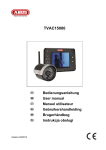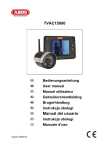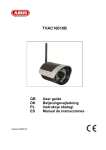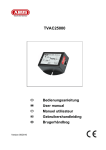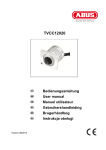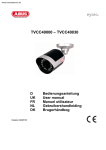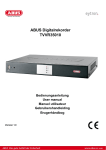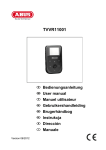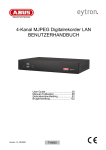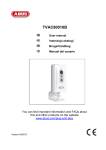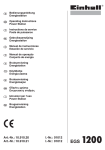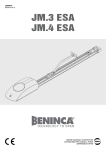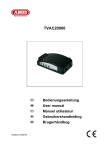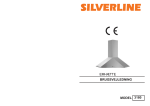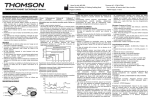Download TVAC15000B
Transcript
TVAC15000B User manual Brugerhåndbog Instrukcja obsługi E Manual del usuario You can find important information and FAQs about this and other products on the website www.abus.com/plug-and-play Version 04/2013 English These user manual contains important information for installation and operation. This should be also noted when this product is passed on to a third party. Therefore look after these operating instructions for future reference! A list of contents with the corresponding page number can be found in the index on page 5. Dansk Denne manual hører sammen med dette produkt. Den indeholder vigtig information som skal bruges under opsætning og efterfølgende ved service. Dette skal huskes også når produkter gives videre til anden part. Læs derfor denne manual grundigt igennem også for fremtiden. Indholdet kan ses med sideanvisninger kan findes i indekset på side 26. Polski Niniejsza instrukcja obsługi zawiera ważne wskazówki dotyczące uruchamiania i obsługi. Pamiętaj o tym, także przekazując produkt osobie trzeciej. Zachowaj instrukcję do wykorzystania w przyszłości! Wykaz treści znajdziesz w spisie treści z podaniem odpowiednich liczb stron na stronie 47. Español Este manual de instrucciones contiene indicaciones importantes para la puesta en funcionamiento y para el manejo. Por este motivo, guarde este manual para poder consultarlo cuando lo necesite y entréguelo junto con el aparato cuando lo transfiera a terceras personas. Un listado de contenidos con la página correspondiente aparece en el índice d la página side 68. TVAC15000B User manual Version 04/2013 Original English user manual. Keep for future use. English Introduction Dear Customer, Thank you for purchasing this product. This device complies with the requirements of the applicable EU directives. The declaration of conformity can be ordered from: ABUS Security-Center GmbH & Co. KG Linker Kreuthweg 5 86444 Affing GERMANY To maintain this condition and to ensure risk-free operation, you as the user must observe these operation instructions! Before initial start-up, read through the complete operating instructions observing operating and safety instructions. All company and product names mentioned in this document are registered trademarks. All rights reserved. If you have any questions, please contact your installer or your local dealer! Warnings Please note: Whosoever unlawfully makes an audio recording of the privately spoken words of another; or uses, or makes a recording thus produced accessible to a third party, could be liable to imprisonment or a fine! Whosoever unlawfully overhears with an eavesdropping device the privately spoken words of another not intended for his attention; or publicly communicates, verbatim or the essential content of, the privately spoken words of another recorded or overheard above could incur the same penalty. Disclaimer This user manual was prepared with greatest care. If you should notice omissions or inaccuracies, please inform us about these on the back of this manual given address. The ABUS Security-Center GmbH assumes no liability for technical and typographical faults and reserves the right to make at any time modifications to the product or user manual without a previous announcement. The company is not liable or responsible for direct and indirect subsequent damages which are caused in connection with the equipment, the performance and the use of this product. No guarantee for the content of this document is taken. 4 English Icon explanation A flash in the triangle is used if there is danger for the health, e.g. by an electric shock. An exclamation mark in the triangle points to an important note in this user manual which must be minded. This symbol can be found when you are to be given tips and information on operation. Important safety advice The warranty will expire for damage due to non-compliance with these operating instructions. ABUS will not be liable for any consequential loss! ABUS will not accept liability for damage to property or personal injury caused by incorrect handling or non-compliance with the safety-instructions. In such cases the warranty will expire. The device has been manufactured in compliance with international safety standards. Please read these safety advices carefully. Safety advice 1. Power supply 100–240 V AC, 50–60 Hz (via power adapter plug to 5 V DC) Operate this product only from the type of power supply indicated on the marking label. If you are not sure of the type of power supplied to your home, consult your local power company. Disconnect the product from the mains before you start any maintenance or installation procedures. 2. Overloading Do not overload a wall outlet, extension cord or adapter as this may result in electric fire or shock. 3. Liquids Protect the device from any kind of liquids entering. 4. Cleaning Disconnect the product from the wall outlet before cleaning. Use a light damp cloth (no solvents) to dust the product. 5. Accessories Do not use any unsupported accessories as these may be hazardous or cause damage the product. 6. Location This device can be used in inside as well as outside. The product will be damaged even it falls from a low height. During the installation of the camera please take care that direct sunlight cannot fall onto the image sensor of the device. Please follow the installation instructions in the corresponding chapter of this user manual. Do not place the device near a radiator or heat register. Setup the device only in areas with the advised operating temperatures of -10° ~ 50°C. 5 English 7. Wireless transmission The range of wireless transmission depends on various environmental factors. The local conditions at the installation location can have a negative impact on the range. For this reason, if there is a clear line of sight between the receiver and the transmitter, the range can be as much as 200 m, but in buildings it is significantly less. The following environmental factors impair both the range and the frame rate: Mobile phone masts, high-tension electricity pylons, power lines, ceiling and walls, devices with the same or similar radio frequency. Warnings Follow all safety and operating advises before starting-up the device! 1. Follow these directions in order to avoid damage of the power cord or plug: Do not modify or process the power cord or plug arbitrarily. Make sure to disconnect the power cord holding the plug. Keep heating appliances as far as possible from the power cord in order to prevent the cover vinyl from melting. The outdoor camera’s power supply unit must be protected against humidity and damp. 2. Follow these directions. Failure to follow any of them may cause electrical shock: Do not open the main body or the power supply. Do not insert metal or inflammable objects inside the product. In order to avoid any damage during lighting use a surge protection. 3. Do not use the product when it is out of order. If you continue to use the product when defective, serious damage can be caused to it. Make sure to contact your local product distributor if the product is out of order. During the installation into an existing video surveillance system make sure that all devices are disconnected from the low and supply voltage circuit. If in doubt allow a professional electrician to mount, install and wire-up your device. Improper electrical connection to the mains does not only represent at threat to you but also to other persons. Wire-up the entire system making sure that the mains and low voltage circuit remain separated and cannot come into contact with each other in normal use or due to any malfunctioning. Avoid using the device under the following unfavorable ambient conditions: wetness or excessive air humidity extreme cold or heat direct sunlight dust or combustible gases, vapors or solvents strong vibration strong magnetic fields, such as those found in the vicinity of machinery or loudspeakers the camera must not be directed into the sun as this can destroy the sensor. the camera may not be installed on unstable surfaces Unpacking While you are unpacking the device please handle it with utmost care. If you notice any damage of the original packaging, please check at first the device. If the device shows damages, please contact your local dealer. 6 English Table of contents 1. Intended Use ........................................................................................................................................... 8 2. Scope of delivery .................................................................................................................................... 8 3. Features and functions .......................................................................................................................... 8 4. Information and FAQs ............................................................................................................................ 8 5. Device description ................................................................................................................................. 9 5.1 Front of the monitor ........................................................................................................................ 9 5.2 Rear of the monitor....................................................................................................................... 10 5.3 Monitor connections ..................................................................................................................... 10 5.4 Camera description ...................................................................................................................... 11 5.5 Cable connections ........................................................................................................................ 11 6. Installation............................................................................................................................................. 12 6.1 Pairing the camera and monitor ................................................................................................... 12 6.2 Installing the camera .................................................................................................................... 12 6.3 Installing the monitor .................................................................................................................... 13 7. Operation ............................................................................................................................................... 14 7.1 Live view....................................................................................................................................... 14 7.2 Main menu.................................................................................................................................... 15 7.3 Camera settings ........................................................................................................................... 16 7.4 Record settings ............................................................................................................................ 17 7.5 Event list ....................................................................................................................................... 18 7.6 System settings ............................................................................................................................ 19 8. Maintenance and cleaning ................................................................................................................... 21 8.1 Maintenance ................................................................................................................................. 21 8.2 Cleaning ....................................................................................................................................... 21 9. Disposal ................................................................................................................................................. 21 10. Tips for troubleshooting ...................................................................................................................... 22 11. Technical data....................................................................................................................................... 23 7 English 1. Intended Use You can use this 2.4 GHz wireless monitor and the IR wireless outdoor camera with PIR for easy wireless transmission and displaying of video signals across middle to long distances. Wireless signal transmission is an advantage in all locations where cables cannot be laid: the camera transmits the video signal to the wireless monitor without the need for wires. Faults and interference can be avoided due to the conversion into digital signals. As soon as the camera’s PIR sensor detects movement, it starts recording to the SD card. You have the option of connecting up to 4 cameras (TVAC15010B) to the monitor and showing then in a quadruple display. A detailed function description can be found in chapter 3 (“Description and functions”). 2. Scope of delivery 3.5" TFT monitor 1 × IR wireless external 2.4 GHz camera, including camera mount and installation material 4 GB SD card 2 x power supply units including EU, AU and UK adapters 5 V DC/1 A AV cable 1 × antenna 3. Features and functions Complete set consists of 3.5" TFT monitor and IR wireless outdoor camera, 2.4 GHz Compact IP66 outdoor camera with infrared night vision function and 400 TVL resolution 3.5" colour TFT with integrated loudspeaker Digital encrypted audio and video transmission User-friendly OSD (on-screen display) 4. Information and FAQs You can find important information and FAQs about this and other products on the website www.abus.com/plug-and-play. You will find information for troubleshooting under item 10 of these instructions. 8 English 5. Device description 5.1 Front of the monitor Battery display Displays the current charge level Red: Battery low Green: Charging Off: Battery completely charged Power LED Device status display Blue: Device switched on Off: Device switched off CH + ▲ Live view: In the menu: channel change switch between menu items Live view: In the menu: reduce volume switch between menu items Live view: In the menu: increase volume switch between menu items ◄ ► CH - ▼ Live view: In the menu: channel change switch between menu items OK key Live view: In the menu: open the events list confirm the settings and changes Rec/Del Live view: start/stop recording In the menu: delete the recording Only possible with SD card! Menu/ESC Live view: open/exit the menu In the menu: exit submenu The system automatically exits the menu after a wait time of one minute. Vol- Vol+ 9 English 5.2 Rear of the monitor Antenna Stand 5.3 Monitor connections Power supply SD card slot 5 V DC/1 A (DC, 14.5 × 4.8 mm) Output for representing the on-screen display, use the AV cable supplied Slot for using an SD card of up to 32 GB Power switch Switch monitor on or off AV output 10 English 5.4 Camera description Antenna Light sensor Fixed lens Power LED LINK LED IR LED PIR sensor Camera mount Pairing button Power supply connection 5 V DC/1 A 5.5 Cable connections Yellow RCA plug (video) Connection for transmitting the video signal White RCA plug (audio) Connection for transmitting the audio signal Jack plug Plug for connecting to the monitor To connect the video RCA plug to a BNC input on a monitor or recorder, attach the BNC-RCA adapter to the yellow RCA plug. 11 English 6. Installation 6.1 Pairing the camera and monitor To connect a camera with the monitor, proceed as follows: 1. 2. 3. 4. Connect the power supply to the cameras and monitor. In the TFT monitor’s menu “Camera Setup -> Pairing” select the camera you require (1–4) and confirm your choice with OK. The systems starts a 60 second countdown. During the 60 seconds, press the PAIRING button on the camera cable until the green LINK LED on the front of the camera starts to flash. Bei erfolgreicher Verbindung leuchtet die LINK-LED der Kamera dauerhaft. Warning: Please note that connection can take up to 60 seconds. 6.2 Installing the camera Select a suitable place for installing the camera using the camera mount. Mark the drill holes on the base and pre-drill them. Insert the wall plugs provided and attach the mount with the screws. Warning: Before you start with the installation, make sure that the wireless transmission range reaches your desired installation location. You now have the option of swivelling the mount by 90° to position it where you want it. Loosen the screw at the side and set the angle of view required. Then tighten the screw in the required position to fasten. 12 English Then screw the camera onto the mount and the power supply unit with the camera. Warning: Only use the antenna provided for the installation. 6.3 Installing the monitor The installed battery gives you the option of using the TFT monitor flexibly. When the battery LED lights up red, the battery needs charging Make sure that the battery is always sufficiently charged in order to guarantee no loss of recording. Warning: Note that the monitor has to be charged for at least 8 hours before it is used without an external power supply for the first time. The battery life is about 3.5 hours. To do this, unfold the stand and position the monitor on the desired location. 13 English To display the monitor display on another device, proceed as follows: 1. 2. Connect the jack plug to the monitor’s AV OUT. Connect the RCA plug to the monitor as shown in the drawing. 7. Operation To switch the monitor ON/OFF, press and hold the power button for at least 2 seconds. Each time it is started, the monitor switches to live view and it selects the last view that was set. If the icon is displayed, the monitor has correctly identified the SD card and it is working normally. 7.1 Live view 01:12:45 2011 05 01 14:30:11 Signal display Channel display Recording display: flashes during recording Motion detection recording activated 14 English Motion detection alarm activated No SD card inserted Full SD SD card full Err SD SD card was not identified SD card locked SD card is overwritten when it reaches capacity SD card display SD card capacity Power supply display Camera brightness display 01:12:45 Recording time 2011 05 01 14:30:11 Date/time display Please note: The icons disappear automatically after being displayed for ten seconds. 7.2 Main menu Press MENU to open the main menu. You can use the arrow buttons to switch between menu items. You can choose between the following Camera-Setup: Camera on/off = show/hide camera Camera Brightness = brightness of camera Pairing = add camera Resolution = image resolution Recorder Setup: Alarm Period = length of alarm when motion is detected Motion Detection = motion detection SD Card Overwrite = SD card circular buffer 15 English Event list: The recordings are stored in sub-folders named after the recording date. The recordings are stored as individual files with the time of recording as the file name. System setup: Quad Display = four-way display Scan Period = dwell time for sequence display Time setting = Date/time settings SD Card Format = format SD card Power Saving = energy-saving mode TV-Format = TV output resolution Set to factory Default = reset to factory defaults System Version = software version of the monitor and camera 7.3 Camera settings Camera on/off = show/hide camera Use the ◄► buttons to select a camera. Press OK to switch between ON and OFF. If you switch the camera OFF, it is no longer shown. Camera Brightness = brightness of camera Use the ◄► buttons to select the desired camera and confirm your choice with OK. The relevant camera image is shown with a selection bar with the options 0–9. You can use the ◄► buttons to change the setting and confirm with OK. 16 English Use the ◄► buttons to select the desired camera and confirm your choice with OK. The systems starts a 60 second countdown. During the 60 seconds, press the PAIRING button on the camera cable until the green LINK LED on the front of the camera starts to flash. Once the connection is successful, the LINK LED on the camera lights up continuously and the monitor switches to live view. Pairing = add camera Use the ◄► buttons to select between the resolutions 640 × 480 and 320 × 240. Confirm your input with OK. Resolution = image resolution Note that the recording time changes for the different resolutions. 7.4 Record settings Alarm Period = length of alarm when motion is detected Use the ◄► buttons to select the desired alarm duration. You can choose between OFF/5 sec/10 sec/15 sec. Confirm your selection with OK. The alarm duration is set to 5 seconds by default. Press any button to switch off the alarm when it sounds. Motion Detection = recording duration for motion detection Use the ◄► buttons to select the recording duration for motion detection. You can choose between OFF/5 sec/10 sec/15 sec. Confirm your input with OK. The recording duration is set to 5 seconds by default. Motion detection is deactivated for 5 seconds after an alarm. 17 English SD Card Overwrite = SD card circular buffer Use the ◄► buttons to activate (ON) or deactivate (OFF) the SD card circular buffer. Confirm your selection with OK. The circular buffer is activated by default. Warning: When the memory capacity is reached, the monitor continues to record, deleting the oldest recordings on the SD card. The SD card capacity display flashes with 0.0 G in red. 7.5 Event list Event List = event list Use the arrow buttons to navigate between folders. Press the OK button to select the desired folder. In the sub-folder, choose the relevant recording file and play it by pressing OK. Press ▲ or ▼ to fast-forward or rewind at the speeds 2×/4×/8×/16×. Note that the maximum recording time for a manual recording is 10 minutes. Once this time elapses, a new file is created. Deleting files Press DEL to enter deletion mode. The current file or folder flashes. You can use the ◄► buttons to select all or one file. Press OK to confirm your choice. Select to delete the selection. To cancel the deletion, select . Warning: Your records are always recorded with audio. Please have a look at page 2 for prevent you or other people to navigate in an illegal situation. For changing the volume by viewing your records please use the buttons „Vol -“ for quieter or „Vol +“ for louder. 18 English 7.6 System settings Use the ◄► buttons to switch the quad display on (ON) or off. To activate quad mode, all the cameras have to be activated. Quad Display = four-way display When in quad display, you can use the arrow buttons to switch directly to full-screen view for individual cameras. ▲ = camera1; ▼ = camera2; ◄ = camera3; ► = camera4 Note that the cameras that are hidden are not shown in the quad display. Warning: Only the full screen of the triggering channel is recorded. To record from all 4 cameras using motion detection, quad display has to be activated. Scan Period = dwell time for sequence display You can define the dwell time for sequence display here. Use the ◄► buttons to choose between OFF/5 sec/10 sec/15 sec. If you are not using cameras, hide them in order to display only the occupied channel. To switch off sequence display, press the CH+/CH button. If you want to start manual recording, press REC. Warning: Note that motion detection is only activated for the channel that is currently displayed. Press the ► button to switch between year/month/day/hours/minutes. Use the ▲▼ buttons to change the values. Confirm your input with OK. Time Setting = Date/time settings 19 English SD Card Format = format SD card You can use this to format the SD card. The system displays the memory that is currently available (Free) and the total memory (Total). Press OK to start formatting. Confirm your selection with and cancel the operation with . Warning: Format the SD card before using it for the first time. Power Saving = energy-saving mode Use the ◄► buttons to switch the energysaving mode ON or OFF. This function is activated by default. This function switches the screen to standby mode after two minutes. The loudspeakers continue to operate at the same volume. Press any button to exit energy-saving mode. TV-Format = TV output resolution Use the ◄► buttons to select the desired TV format. You can choose between NTSC and PAL. Confirm your input with OK. Note that the format selected can affect the resolution. Set to Factory Default = reset to factory defaults Press OK to start the factory settings. Confirm your selection with and cancel the operation with . Please note: Note that this operation does not format the SD card. 20 English System Version = software version of the monitor and camera This function shows you the software versions of the monitor and all the connected cameras. 8. Maintenance and cleaning 8.1 Maintenance Regularly check the product's physical state, e.g. check for damage of the housing. If you suspect that safe operation cannot be guaranteed anymore, disconnect the product and ensure that it cannot be used by mistake. You can assume that safe operation is not possible anymore when the device shows visible damage, the device does not function anymore Please note: The product is maintenance free for you. Inside the product are no parts that can be checked or repaired, so do not ever open it. 8.2 Cleaning Wipe the product with a clean, dry cloth. If the device is very dirty, you can moisten the cloth with lukewarm water. Make sure that no liquids can enter the equipment as the device can be destroyed. Never use chemical detergents as they could attack the surface of the device 9. Disposal Important: The EU Directive 2002/96/EG regulates the proper return, treatment and recycling of used electronic devices. This symbol means that in the interest of environmental protection the device must be disposed of separately from household or industrial waste at the end of its service life in accordance with applicable local legal guidelines. Disposing of used devices can be done at official recycling centers in your country. Obey local regulations when disposing of material. Further details on returns (also for non-European countries) can be obtained at your local authority. Separate collection and recycling saves natural resources and ensures that all the provisions for protecting health and environment are observed when recycling the product. 21 English 10. Tips for troubleshooting No. Question Answer 1 Pairing creates the exclusive, encrypted wireless connection between the monitor and camera. What does pairing the monitor and camera mean and how does this work? To connect a camera to the monitor, proceed as follows: 1. Connect the power supply units to the cameras and the monitor. 2. In the “Camera Setup -> Pairing” menu of the TFT monitor, select a camera (1-4) and confirm the selection with OK. The system counts down from 60 seconds. 3. During the 60 seconds, press the PAIRING button on the camera cable until the green LINK LED on the front of the camera starts flashing. 4. Once the connection is established, the LINK LED on the camera is lit up continuously and the monitor switches to live view. Please note that connection can take up to 60 seconds. If you do not have a picture signal, please check the following: 1. Is the camera connected to the power supply (does the LED light up red)? 2. Are the camera and monitor paired with each other? 3. Is the camera within range of the monitor? 4. Is the signal between the camera and monitor disrupted? 2 What could be the reasons why the monitor displays “NO SIGNAL” instead of a picture? 3 What could be the reasons why the device does not record? If your device does not record, please check the following: 1. Have you inserted an SD card? 2. Is the SD card locked? (Lock/Unlock?) 3. Have you formatted the SD card? It must be formatted before it is first used. 4 What could be the reasons why the device does not record when there is movement? What should I do if, in night mode, half of the image shows nothing and remains black? The “motion detection” function may be switched off. Please go into the “Recorder Setup / Motion Detection / ON/OFF” menu and set the function to “ON”. 5 6 Is a standby mode possible? 7 Can the sound for the motion detection be adjusted? Can more than one monitor be used at the same time? 8 The camera has an integrated infrared swivel filter which ensures the camera switches to night mode when it is dark. If part of the image is black, it is possible that the swivel filter has got stuck mechanically. Tapping the camera lightly can solve this problem. You can switch the device to an energy saving mode. If the camera detects a movement during this time, the image is automatically displayed. Yes, in the menu item “Record Settings” you can turn off the alarm tone. You will find this under “Alarm Period”. No, for technical reasons this is not possible because a camera can only be paired directly with one monitor (camera(s) and monitor form a pair). 22 English 11. Technical data Model number Frequency Modulation Transmission power Sensitivity TV lines Image sensor Resolution No. of IR LEDs Lens Angle of view PIR angle of view PIR range Night vision function range IR swivel filter IP protection class Wireless range Power supply Power consumption Operating temperature Dimensions (L × W × H) Weight TVAC15000B Camera 2.4 GHz GFSK 16 dBm -82 dBm 400 TVL 1/4" CMOS 640 × 480 pixel (VGA) 27 IR LEDs 3.6 mm 56° (H)/43° (V) 60° (H)/50° (V) Max. 5 m approx. 10 m Yes IP66 approx. 100 m (clear sight line)* 5 V DC/1 A Max. 550 mA -10 °C–50 °C 120 × 71 × 68 (without antenna and mount) 320 g TVAC15000B 3.5" TFT monitor Model number Frequency Modulation Transmission power Sensitivity Transmission cable Resolution Video signal Audio signal Storage medium Outputs Wireless range Battery type Battery life Power supply Power consumption Operating temperature Dimensions Weight 2.4 GHz GFSK 16 dBm -82 dBm 4 640 × 480 pixels (VGA)/320 × 240 pixels (QVGA) 1.0 V p-p, 75 Ohm 1.0 V p-p, 600 Ohm SDHC card, max. 32 GB 3.5 mm jack (video) approx. 100 m (clear sight line)* Li ion polymer battery, 3.7 V / 1800 mAh approx. 3.5 hours 5 V DC/1 A Max. 650 mA -10 °C–50 °C 130 × 90 × 27 mm 200 g *The range depends on the ambient conditions (e.g. mobile phone masts, high-tension electricity pylons, power lines, ceiling and walls, etc.). If the conditions are unfavourable, the range may be very restricted. 23 TVAC15000B Brugerhåndbog Version 04/2013 Original betjeningsmanual på dansk. Opbevares til fremtidige formål! Dansk Indføring Kære kunde, vi takker Dem fordi du har købt dette produkt. Dette apparat opfylder kravene i gældende EU-direktiver. Overensstemmelseserklæringen kan rekvireres hos: ABUS Security-Center GmbH & Co. KG Linker Kreuthweg 5 86444 Affing GERMANY For at opnå denne tilstand og sikre en idriftsætning uden farer må du som bruger sætte dig ind i denne betjeningsvejledning! Inden idriftsætning af produktet læs da hele betjeningsvejledningen, og se her om betjening og sikkerhedsforskrifter! Alle indeholdte firmanavne og produktbeskrivelser er varemærker hos den aktuelle producent og der tages forbehold for alle rettigheder. Ved spørgsmål henvend Dem da til din forhandler eller installatør! Advarsler Bemærk: Den, der uden tilladelse optager en anden persons ikke-offentligt udtalte udtalelse på et lydmedium eller anvender en optagelse, der er fremstillet på denne måde, eller lader tredjeperson få adgang til den, kan straffes med frihedsstraf eller bøde! Den, der uden tilladelse aflytter en anden persons ikke-offentligt udtalte udtalelse, der ikke er tiltænkt vedkommende, med et lytteapparat eller offentligt gengiver en anden persons optagede eller aflyttede ikkeoffentligt udtalte udtalelse ordret eller det væsentlige indhold, kan også straffes. Hæftelses udelukning Denne betjeningsvejledning er lavet med den største omhu. Skulle der alligevel være udslag eller unøjagtigheder så meddel os det venligst via den adresse der står på bagsiden af vejledningen. ABUS Security-Center GmbH tager ikke ansvar for teknisk eller typografiske fejl, og forbeholder sig retten til at til enhver tid og uden forudgående advisering at foretage ændringer ved produktet og betjeningsvejledningen. ABUS Security-Center kan ikke stilles til ansvar eller hæftelse for følgeskader ved brug af produktet såvel i drift som ibrugtagning. Der gives ingen garanti for indholdet af dette dokument. 25 Dansk Ikon forklaring Et lyn i en trekant betyder at der er en helbredsrisiko forbundet med elektrisk stød. Et udråbstegn I en trekant, betyder at man skal kigge i manualen efter vigtige henvisninger.. Dette symbol findes når der bliver gives vigtige oplysninger. Vigtige sikkerhedsinformationer Garantien forsvinder hvis anbefalinger I manualen ikke følges nøjagtigt. ABUS er ikke ansvarlig for konsekvenserne af dette! ABUS vil ikke et ansvar for skader af egendom eller personlige skader forsaget af forkert behandling eller uoverensstemmelse af sikkerhedsinstruktionerne. I sådanne tilfælde ophører garantien. Denne enhed er lavet efter internationale sikkerhedsstandarter, læs venligst sikkerheds instruktionerne omhyggeligt. Sikkerhedsinstruktioner 1. Strømforsyning 100–240 V AC vekselspænding, 50–60 Hz (via strømforsyning til 5 V DC) Forsyn dette produkt med en strømforsyningstype af typen der star på mærkaten. Hvis du ikke er sikker på hvilken forsyning der findes i dit hjem, kontakt derfor dit lokale elforsyningsfirma. Fjern produktet fra hovedforsyningen før du starter installationen. 2. Overbelastning Lad vær med at overbelaste en vægkontakt, en forlænger eller en adapter. Dette kan resultere i elektrisk ild eller stød. 3. Væsker Installer kun enheden i tørre og støvbeskyttede rum, beskyt enheden imod alle slags former for væsker. 4. Rensning Fjern enheden fra hovedforsyningen. Brug en let dampet klud(Ingen opløsningsmidler) til at støve af produktet. 5. Tilbehør Lad vær med at bruge tilbehør som ikke er godkendt, dette kan give skader på produktet. 6. Placering Dette apparat er både udviklet til anvendelse i beskyttede udendørsområder og til anvendelse indendørs. Et fald selv fra lav højde kan beskadige produktet. Monter produktet på en sådan måde, at apparatets billedoptager ikke udsættes for direkte sollys. Vær opmærksom på monteringsoplysningerne i det pågældende kapitel i denne betjeningsvejledning. Beskyt enheden med alle former for væsker. Placer ikke enheden nær radiatorer ikke varmeblæsere. Placer enheden i miljøer med temperaturer imellem -10° ~ 50°C. 26 Dansk 7. Trådløs overførsel Den trådløse overførsels rækkevidde afhænger af forskellige miljøpåvirkninger. De lokale forhold på monteringsstedet kan påvirke rækkevidden negativt. Derfor kan ved frit udsyn opnås en strækning på indtil 200 m mellem modtageren og senderen, men i bygninger betydeligt mindre. Følgende miljøpåvirkninger begrænser både rækkevidden og billedhastigheden: Mobiltelefonantenner, højspændingsmaster, elektriske ledninger, lofter og vægge, apparater med den samme eller tilstødende trådløse frekvens. Advarsler Følg alle sikkerheds instruktioner før at installationen begynder! 1. Følg alle disse bestemmelser for at undgå skader af strømledningen og stikket. Lad vær med at ændre strømledningen eller stikket vilkårligt. Vær sikker på at afkoble ledningen når du holder i stikket. Hold varme enheder så langt væk fra ledningen, for at undgå at vinyl kappen kan smelte. Udendørskameraets strømforsyning skal beskyttes mod fugt og væde. 2. Følg disse instruktioner. Hvis ikke, kan det forsage elektrisk stød: Åben ikke hovedenheden eller strømforsyningen. Lad vær med at indsætte metal eller brandfarlige ting i enheden. For at undgå skade ved lyn, brug derfor an overspændings beskytter. 3. Lad vær med at bruge produktet hvis det er gået i stykker. Hvis dette gøres, kan der ske større skade.. Kontakt den lokale leverandør hvis produktet er gået i stykker. Under installationen i et eksisterende videoovervågnings system, vær da sikker på at alle enheder er fjerne fra lav og 230 VAC strømforsyninger. I tvivl, brug derfor en professionel elinstallatør til at installere og opsætte elektricitet til produktet. Forkert installation er til fare for dig og andre. Installer det således at ingen frie strømkabler kan komme I kontakt med personer under brug og ved problemer. Undgå følgende problematiske omgivelser ved betjeningen: Våde omgivelser eller for høj luftfugtighed Ekstrem kulde eller varme. Direkte sollys Støv eller brændbare gasser, dampe eller opløsningsmidler kraftige rystelser kraftige magnetfelter, som f.eks. i nærheden af maskiner eller højtalere. Kameraet må ikke rettes mod solen. Det kan medføre ødelæggelse af sensoren. Kameraet må ikke installeres på ujævne flader. Udpakning Når du pakker apparatet ud skal dette gøres med forsigtighed. Ved en eventuel beskadigelse på forpakningen da tjek venligst om enheden også har synlige tegn på skade. Såfremt at dette er tilfældet skal du hurtigst muligt returnere/ gøre opmærksom på dette overfor leverandøren. 27 Dansk Indholdsfortegnelse 1. Korrekt anvendelse .............................................................................................................................. 29 2. Leveringsomfang ................................................................................................................................. 29 3. Kendetegn og funktioner ..................................................................................................................... 29 4. Henvisninger og FAQs ......................................................................................................................... 29 5. Apparatbeskrivelse .............................................................................................................................. 30 5.1 Beskrivelse af monitorens forside ................................................................................................ 30 5.2 Beskrivelse af monitorens bagside .............................................................................................. 31 5.3 Beskrivelse af monitorens tilslutninger ......................................................................................... 31 5.4 Beskrivelse af kameraet ............................................................................................................... 32 5.5 Beskrivelse af kabeltilslutningerne ............................................................................................... 32 6. Installation............................................................................................................................................. 33 6.1 Forbindelse af kameraerne og monitoren .................................................................................... 33 6.2 Kameramontering ......................................................................................................................... 33 6.3 Monitorinstallation ........................................................................................................................ 34 7. Betjening ............................................................................................................................................... 35 7.1 Live-visning .................................................................................................................................. 35 7.2 Hovedmenu .................................................................................................................................. 36 7.3 Kameraindstillinger ....................................................................................................................... 37 7.4 Optagelsesindstillinger ................................................................................................................. 38 7.4 Hændelsesliste ............................................................................................................................. 39 7.5 Systemopsætning......................................................................................................................... 40 8. Vedligeholdelse og rengøring ............................................................................................................. 42 8.1 Vedligeholdelse ............................................................................................................................ 42 8.2 Rengøring ..................................................................................................................................... 42 9. Vækanskaffelse .................................................................................................................................... 42 10. Tips vedrørende fejlafhjælpning ......................................................................................................... 43 11. Tekniske data ........................................................................................................................................ 44 28 Dansk 1. Korrekt anvendelse Med denne 2,4 GHz trådløse monitor og det trådløse IR-udendørskamera med PIR kan du uden problemer overføre og vise videosignaler trådløst over mellestore til store afstande. Den trådløse signaloverførsel er en fordel over alt, hvor det ikke er muligt at trække kabler: Kameraet overfører videosignalet trådløst til den trådløse monitor. På grund af omformningen til digitale signaler kan forstyrrelser og interferenser dermed undgås. Så snart kameraets PIR-sensor registrerer en bevægelse, starter optagelsen på SD-kortet. Du har mulighed for at forbinde indtil 4 kameraer (TVAC15010B) med monitoren og at vise dem i den 4-dobbelte visning. En udførlig funktionsbeskrivelse finder du i kapitel „3. Kendetegn og funktioner“. 2. Leveringsomfang 3,5" TFT-monitor 1 × trådløst IR-udendørskamera 2,4 GHz inkl. kameraholder og monteringsmateriale SD-kort 4 GB 2 × strømforsyning inkl. EU-, AU- og UK-adapter 5 V DC/1 A AV-kabel 1 × antenne 3. Kendetegn og funktioner Komplet sæt bestående af 3,5“ TFT-monitor og trådløst IR-udendørskamera 2,4 GHz Kompakt IP66 udendørskamera med infrarød natsigtfunktion og 400 TVL opløsning 3,5“ farve-TFT med integrerede højttalere Digital kodet audio- og videooverførsel Brugervenligt OSD (on-screen-menu) 4. Henvisninger og FAQs Vigtige henvisninger og FAQs vedrørende dette produkt og andre produkter findes på internetsiden www.abus.com/plug-and-play. Informationer om fejlafhjælpningen findes under punkt 10 i denne vejledning. 29 Dansk 5. Apparatbeskrivelse 5.1 Beskrivelse af monitorens forside Batterivisning Visning af den aktuelle ladetilstand Rød: Batteri lavt Grøn: Opladning Slukket: Batteri fuldstændigt opladet Power LED Visning af apparatstatus Blå: Apparat tændt Slukket: Apparat slukket CH + ▲ Live-visning: I menuen: Kanalskift Skift mellem menupunkterne Live-visning: I menuen: Reducerer lydstyrken Skift mellem menupunkterne Live-visning: I menuen: Forøger lydstyrken Skift mellem menupunkterne ◄ ► CH - ▼ Live-visning: I menuen: Kanalskift Skift mellem menupunkterne OK-tast Live-visning: I menuen: Henter hændelseslisten Bekræfter indstillingerne og ændringerne Rec/Del Live-visning: Starter/standser optagelsen I menuen: Sletter optagelsen Kun mulig med SD-kort! Menu/ESC Live-visning: Henter/forlader menuen I menuen: Forlader undermenuen Systemet forlader automatisk menuen efter et minuts ventetid. Vol- Vol+ 30 Dansk 5.2 Beskrivelse af monitorens bagside Antenne Fod 5.3 Beskrivelse af monitorens tilslutninger Spændingsforsyning SD-kort-slot 5 V DC/1 A (DC, 14,5 × 4,8 mm) Udgang for visningen af skærmvisningen, anvend hertil det vedlagte AV-kabel. Slot til anvendelse af et SD-kort indtil 32 GB Power-tast Tænder og slukker monitoren AV-udgang 31 Dansk 5.4 Beskrivelse af kameraet Antenne Lyssensor Fast objektiv Power LED Link LED IR-LED PIR-sensor Kameraholder Pairing-tast Tilslutning spændingsforsyning 5 V DC/1 A 5.5 Beskrivelse af kabeltilslutningerne Gult chinch-stik (video) Tilslutning til overførslen af videosignalet Hvidt chinch-stik (audio) Tilslutning til overførslen af audiosignalet Jack-stik Stik til tilslutningen til monitoren For at kunne forbinde video-chinch-stikket med en BNC-indgang på en monitor eller optager skal BNC-RCAadapteren sættes på det gule chinch-stik. 32 Dansk 6. Installation 6.1 Forbindelse af kameraerne og monitoren Gå frem på følgende måde for at forbinde et kamera med monitoren: 1. 2. 3. 4. Tilslut strømforsyningerne til kameraerne og monitoren. Vælg det ønskede kamera (1-4) i TFT-monitorens menu “Camera Setup -> Pairing”, og bekræft valget med OK. Systemet tæller nedad fra 60 sekunder. Tryk på PAIRING-tasten på kameraets kabel i de 60 sekunder, indtil den grønne LINK LED på forsiden af kameraet begynder at blinke. Når forbindelsen er etableret, lyser LINK-LED på kameraet konstant. Vigtigt: Vær opmærksom på, at forbindelsesvarigheden kan vare indtil 60 sekunder. 6.2 Kameramontering Vælg et egnet sted til installationen ved hjælp af kameraholderen. Tegn nu boringshullerne på underlaget, og bor dem. Sæt de vedlagte dyvler i, og fastgør nu holderen med skruerne. Vigtigt: Før du påbegynder installationen, skal du sikre dig, at den trådløse overførsels rækkevidde findes på stedet for den ønskede installation. Du har mulighed for at dreje holderen 90° for at vælge en ønsket position. Løsn først skruen på siden, og indstil den ønskede synsnvinkel. Fastgør derefter skruen for at fastgøre den ønskede position. 33 Dansk Skru derefter kameraet på holderen, og forbind strømforsyningen med kameraet. Vigtigt: Anvend kun de vedlagte antenner til installationen. 6.3 Monitorinstallation Med den indbyggede batteri har du mulighed for at anvende TFT-monitoren fleksibelt. Når batteri-LED'en lyser rødt, skal batteriet oplades. Sørg for, at batteriet altid er tilstrækkeligt opladet, så der sikres en optagelse uden tab. Vigtigt: Vær opmærksom på, at monitoren skal oplades i mindst 8 timer, før den anvendes første gang uden ekstern spændingsforsyning! Batteriets funktionstid er ca. 3,5 timer. Vip hertil foden ud, og placér monitoren på det ønskede sted. 34 Dansk Gå frem på følgende måde for at vise monitorvisningen på endnu et visningsapparat: 1. Forbind jack-stikket med AV OUT på monitoren. 2. Tilslut jack-stikket til monitoren som på tegningen. 7. Betjening Hold Power-tasten trykket ind i min. 2 sekunder for at slå monitoren TIL/FRA. Efter hver start skifter monitoren til live-visningen og vælger den sidste indstillede visning. Hvis symbolet vises, blev SD-kortet registreret rigtigt af monitoren og fungerer normalt. 7.1 Live-visning 01:12:45 2011 05 01 14:30:11 Signalvisning Kanalvisning Optagelsesvisning: Blinker under optagelsen Bevægelsesgenkendelse-optagelse aktiveret 35 Dansk Bevægelsesgenkendelse-alarmering aktiveret Intet SD-kort sat i Full SD SD-kort fuldt Err SD SD-kort kan ikke registreres SD-kort spærret SD-kort overskrives, når kapaciteten nås SD-kort-visning SD-kort kapacitet Spændingsforsyningsvisning Kamera-lysstyrkevisning 01:12:45 Optagelsestid 2011 05 01 14:30:11 Visning af dato/klokkeslæt Vær opmærksom på: Symbolerne skjules automatisk efter ti sekunders visningstid. 7.2 Hovedmenu Tryk på MENU-tasten for at åbne hovedmenuen. Med piletasterne kan du skifte mellem menupunkterne. Du kan vælge mellem følgende punkter: Kameraindstillinger: Camera on/off = viser/skjuler kamera Camera Brightness = kameraets lysstyrke Pairing = tilføjer kamera Resolution = opløsning Optagelsesindstillinger: Alarm Period = alarmens varighed ved bevægelsesgenkendelse Motion Detection = bevægelsesgenkendelse SD Card Overwrite = SD-kort-ringlager 36 Dansk Hændelsesliste: Optagelserne gemmes i undermapper, der betegnes efter optagelsesdatoen. Optagelserne gemmes som enkeltfil med optagelsestiden som filnavn. Systemopsætning: Quad Display = quad-visning Scan Period = varighed sekvensvisning Time setting = dato-/klokkeslætindstillinger SD Card Format = formaterer SD-kortet Power Saving = energibesparelsesmodus TV-Format = tv-gengivelsesopløsning Set to factory Default = genopretter fabriksindstillingerne System Version = monitorens og kameraernes softwareversion 7.3 Kameraindstillinger Camera on/off = viser/skjuler kamera Anvend tasterne ◄► til at vælge et kamera. Tryk på OK-tasten for at skifte mellem ON (TIL) eller OFF (FRA). Når du stiller et kamera på OFF, skjules det. Camera brightness = kameraets lysstyrke Vælg det ønskede kamera med tasterne ◄►, og bekræft det med OK-tasten. Det pågældende kamerabillede vises med en udvalgslinje fra 0 til 9. Med tasterne ◄► kan du ændre indstillingerne og bekræfte dem med OKtasten. 37 Dansk Pairing = tilføjer kamera Vælg det ønskede kamera med tasterne ◄►, og bekræft valget med OK-tasten. Systemet tæller nu nedad fra 60 sekunder. Tryk på PAIRING-tasten på kameraets kabel i de 60 sekunder, indtil den grønne LINK LED på forsiden af kameraet begynder at blinke. Når forbindelsen er etableret, lyser LINK-LED på kameraet konstant, og monitoren skifter til live-visningen Resolution = opløsning Anvend tasterne ◄► til at vælge mellem opløsningern 640 × 480 og 320 × 240. Bekræft valget med OK-tasten. Vær opmærksom på, at optagelsestiden ændres ved de forskellige opløsninger. 7.4 Optagelsesindstillinger Alarm Period = alarmeringens varighed ved bevægelsesgenkendelse Anvend tasterne ◄► til at vælge den ønskede varighed for alarmeringen. Du kan vælge mellem OFF/5 Sec/10 Sec/15 Sec. Bekræft valget med OK-tasten. Alarmeringens varighed er som standard indstillet på 5 Sec. Tryk på en vilkårlig tast for at slå alarmtonen fra i tilfælde af alarm. Motion Detection = optagelsesvarighed bevægelsesgenkendelse Vælg optagelsesvarigheden ved bevægelsesgenkendelse med tasterne ◄►. Du kan vælge mellem OFF/5 Sec/10 Sec/15 Sec. Bekræft valget med OK-tasten. Optagelsesvarigheden er som standard indstillet på 5 Sec. Bevægelsesgenkendelsen er deaktiveret i 5 sekunder efter en alarm. 38 Dansk Anvend tasterne ◄► til at aktivere SD-kortringlageret (ON) eller deaktivere det (OFF). Bekræft valget ved at trykke på OK-tasten. Ringlageret er som standard aktiveret. Vigtigt: Når lagerkapaciteten er nået, fortsætter monitoren med at optage og sletter i den forbindelse de ældste optagelser på SDkortet. SD-kortets kapacitetsvisning blinker med 0.0 G med rødt. SD Card Overwrite = SD-kort-ringlager 7.4 Hændelsesliste Event List = hændelsesliste Anvend piletasterne til at navigere mellem mapperne. Tryk på OK-tasterne for at vælge den ønskede mappe. Vælg den pågældende optagelsesfil i undermappen, og afspil den ved at trykke på OK-tasten. Tryk på tasterne ▲ eller ▼ for at spole frem eller tilbage med trinene 2x/4x/8x/16x. Sørg for, at den maks. optagelsesvarighed er 10 minutter ved en manuel optagelse. Ved overskridelse oprettes der en ny fil. Sletning af filer Tryk på DEL-tasten for at komme til slettemodusen. Den aktuelle fil eller den aktuelle mappe blinker. Med tasterne ◄► kan du vælge mellem alle eller en fil. Tryk på OK-tasten for at bekræfte valget. Vælg Vælg for at slette valget. for at afbryde sletningen. Advarsler: Dine registreringer er altid optaget med lyd. Du bedes have et kig på side 24 for at forhindre dig eller andre mennesker til at navigere i en ulovlig situation. For at ændre lydstyrken ved at se dine optegnelser kan du bruge knapperne "VOL -" for støjende eller "VOL +" for højere. 39 Dansk 7.5 Systemopsætning Anvend tasterne ◄► til at slå quad-visningen til (ON) eller fra. For at aktivere quad-modusen skal alle kameraer være aktiveret. Quad Display = quad-visning Med piletasterne kan du skifte direkte fra quadvisningen til full screen for de enkelte kameraer. ▲ = kamera 1 ▼ = kamera 2 ◄ = kamera 3 ► = kamera 4 Vær opmærksom på, at kameraer, der er skjult, ikke vises i quad-visningen. Vigtigt: Kun full screen for den udløsende kanal optages. For at realisere en optagelse af alle 4 kameraer ved hjælp af bevægelsesgenkendelsen skal quadvisningen være aktiveret. Scan Period = varighed sekvensvisning Her kan du definere sekvensvisningens varighed. Du kan vælge mellem værdierne OFF/5 Sec/10 Sec/15 Sec med tasterne ◄►. Hvis der er kameraer, som du ikke anvender, skal du skjule dem for kun at vise de optagede kanaler. Tryk på tasterne CH+/CH- for at frakoble sekvensvisningen. Tryk på REC-tasten, hvis du ønsker at starte en manuel optagelse. Vigtigt: Vær opmærksom på, at bevægelsesgenkendelsen kun er atkiveret ved den aktuelt viste kanal. Time Setting = dato-/ klokkeslætindstillinger 40 Tryk på tasten ► for at skifte mellem år/måned/dag/timer/minutter. Anvend tasterne ▲▼ til at tilpasse værdierne. Bekræft indtastningen med OK-tasten. Dansk SD Card Format = formaterer SD-kortet Hermed kan du formatere SD-kortet. Der vises både den aktuelt frie lagerplads (Free) og den samlede lagerplads (Total). Tryk på OK-tasten for at starte formateringen. Bekræft dit valg med , vælg for at afbryde processen. Vigtigt: Formatér SD-kortet før den første anvendelse. Power Saving = energibesparelsesmodus Anvend tasterne ◄► til at slå energibesparelsesmodusen til (ON) eller fra (OFF). Som standard er denne funktion aktiveret. Skærmen skifter med denne funktion til standbymodus efter to minutter. Højttalerne fortsætter med at fungere med samme lydstyrke i dette tidsrum. Tryk på en vilkårlig tast for at forlade energibesparelsesmodusen. TV-Format = tv-gengivelsesopløsning Vælg det ønskede tv-format med tasterne ◄►. Du kan vælge mellem NTSC og PAL. Bekræft valget med OK-tasten. Vær opmærksom på, at det valgte format kan påvirke opløsningen. Set to Factory Default = genopretter fabriksindstillingerne Tryk på OK-tasten for at starte fabriksindstillingerne. Bekræft dit valg med , vælg processen. for at afbryde Bemærk: Vær opmærksom på, at SD-kortet ikke formateres under denne proces. 41 Dansk System Version = monitorens og kameraernes softwareversion Denne funktion viser monitorens og alle tilsluttede kameraers softwareversioner. 8. Vedligeholdelse og rengøring 8.1 Vedligeholdelse Kontroller regelmæssigt produktets tekniske sikkerhed, f.eks. skader på kabinettet. Hvis man har en formodning om, at en risikofri drift ikke længere er muligt, skal produktet sættes ud af drift og sikres mod utilsigtet betjening. Fjern akkumulatorerne. Det kan antages, at en risikofri drift ikke længere er mulig, når apparatet har tydelige beskadigelser, apparatet ikke længere fungerer Vær venligst opmærksom på: Produktet er vedligeholdelsesfrit for dig. Der er ingen dele i den indvendige del produktet, som kræver kontrol eller vedligeholdelse. Du må aldrig åbne det (bortset fra det akkumulatorskift, der bliver beskrevet i denne betjeningsvejledning). 8.2 Rengøring Rengør produktet med en ren og tør klud. Ved kraftig tilsmudsning brug en let fugtig klud med lunkent vand. Vær opmærksom på, at der ikke kommer væsker ind i apparatet Anvend ikke kemiske rengøringsmidler, og vær sikker på at der ikke kommer vand ind i kameraet. 9. Vækanskaffelse Vigtigt: EU-direktiv 2002/96/EF regulerer den korrekte tilbagetagning, behandling og anvendelse af brugte elektronikapparater. Dette symbol betyder, at med henblik på miljøbeskyttelse skal apparatet efter sin levetid bortskaffes i overensstemmelse med de gældende lovmæssige forskrifter og adskilt fra husholdningsaffald og erhvervsaffald. Bortskaffelsen af det brugte apparat kan foretages på de respektive officielle tilbagetagningssteder. Følg de lokale forskrifter, når materialerne bortskaffes. Yderligere enkeltheder om tilbagetagningen (også for lande uden for EU) får du hos dine lokale myndigheder. Ved hjælp af den separate indsamling og recycling skånes de naturlige ressourcer, og det sikres, at alle bestemmelser vedrørende beskyttelse af sundhed og miljø overholdes ved recycling af produktet. 42 Dansk 10. Tips vedrørende fejlafhjælpning Nr. Spørgsmål Svar 1 Med forbindelsen etableres den eksklusive, kodede trådløse forbindelse mellem kamera og monitor. Hvad betyder det at forbinde monitor og kamera, og hvordan fungerer det? Gå frem på følgende måde for at forbinde et kamera med monitoren: 1. Tilslut strømforsyningerne til kameraerne og monitoren. 2. Vælg det ønskede kamera (1-4) i TFT-monitorens menu „Camera Setup -> Pairing“, og bekræft valget med OK. Systemet tæller nedad fra 60 sekunder. 3. Tryk på PAIRING-tasten på kameraets kabel i de 60 sekunder, indtil den grønne LINK LED på forsiden af kameraet begynder at blinke. 4. Når forbindelsen er etableret, lyser LINK-LED på kameraet konstant, og monitoren skifter til live-visningen Vær opmærksom på, at forbindelsesvarigheden kan vare indtil 60 sekunder. Kontrollér følgende, hvis du ikke har et billedsignal: 1. Er kameraet tilsluttet strømnettet (lyser LED'en rødt?) 2. Er kameraet og monitoren forbundet med hinanden? 3. Er kameraet inden for monitorens rækkevidde? 4. Er der fejl ved signalet mellem kamera og monitor? 2 Hvad kan være årsagerne til, at monitoren ikke viser, men "NO SIGNAL"? 3 Hvad kan være årsagerne til, at apparatet ikke optager? Kontrollér følgende punkter, hvis dit apparatet ikke optager: 1. Har du sat et SD-kort i? 2. Er SD-kortet spærret? (Lock/Unlock?) 3. Har du formateret SD-kortet? Det skal formateres før det tages i brug. 4 Hvad kan være årsagerne til, at apparatet ikke optager ved bevægelse? Hvad skal man gøre, hvis en halvdel af billedet ikke vises i natfunktionen, men forbliver sort? Er en standby-modus mulig? Funktionen "bevægelsesregistrering" er evt. frakoblet. Gå til menuen "Recorder Setup / Motion Detection / ON/OFF", og indstil funktionen på "ON". Kameraet har et integreret infrarødt drejefilter, som i mørke sørger for, at kameraet skifter til natmodus. Hvis en del af billedet er sort, er det muligt, at drejefilteret sidder mekanisk fast. Det kan løsnes ved at banke let på kameraet. Du kan indstille apparatet på en energibesparelsesmodus. Hvis kameraet registrerer en bevægelse i dette tidsrum, vises billedet automatisk. Kan lyden indstilles ved bevægelsesregistreringen? Kan flere monitorer anvendes samtidigt? Ja, i menupunktet „Record Settings“ kan du frakoble alarmtonen. Det finder du under „Alarm Period“. Nej, det er af tekniske grunde ikke muligt, da et kamera kun kan forbindes med en monitor (kamera(er) og monitor udgør et par). 5 6 7 8 43 Dansk 11. Tekniske data Typenummer Frekvens Modulation Sendeeffekt Følsomhed Tv-linjer Billedoptager Opløsning Antal IR LED'er Objektiv Synsvinkel PIR-synsvinkel PIR-rækkevidde Rækkevidde natsigtfunktion IR-drejefilter IP-kapslingsklasse Trådløs rækkevidde Spændingsforsyning Strømforbrug Driftstemperatur Mål (L × B × H) Vægt TVAC15000B Kamera 2,4 GHz GFSK 16 dBm -82 dBm 400 TVL 1/4" CMOS 640 × 480 pixel (VGA) 27 IR LED’er 3,6 mm 56° (H)/43° (V) 60° (H)/50° (V) Maks. 5 m Ca. 10 m Ja IP66 Ca. 100 m (frit udsyn)* 5 V DC/1 A Maks. 550 mA -10 °C–50 °C 120 × 71 × 68 (uden antenne og holder) 320 g TVAC15000B 3,5" TFT-monitor Typenummer Frekvens Modulation Sendeeffekt Følsomhed Overførselskanaler Opløsning Videosignal Audiosignal Lagermedium Udgange Trådløs rækkevidde Batteritype Batteriets funktionstid Spændingsforsyning Strømforbrug Driftstemperatur Mål Vægt 2,4 GHz GFSK 16 dBm -82 dBm 4 640 × 480 pixel (VGA)/320 × 240 pixel (QVGA) 1,0 V p-p, 75 ohm 1,0 V p-p, 600 ohm SDHC-kort, maks. 32 GB 3,5 mm jack (video) Ca. 100 m (frit udsyn)* Li-ion polymer batteri, 3,7 V / 1800 mAh Ca. 3,5 timer 5 V DC/1 A Maks. 650 mA -10 °C–50 °C 130 × 90 × 27 mm 200 g * Rækkevidden afhænger af omgivelsesbetingelserne (f.eks. mobiltelefonantenner, højspændingsmaster, elektriske ledninger, lofter og vægge osv.). Under ugunstige betingelser kan der også kun opnås mindre rækkevidder! 44 Polski TVAC15000B Podręcznik użytkowania Wersja 04/2013 Niniejszy podręcznik użytkownika zawiera ważne informacje dotyczące instalacji i obsługi. Należy zwrócić uwagę na ten fakt przy przekazywaniu niniejszego produktu osobom trzecim. Instrukcję obsługi należy zachować do późniejszego wglądu! 101 Polski Wprowadzenie Drogi Kliencie, Dziękujemy za zakup naszego produktu. To urządzenie spełnia wymogi obowiązujących dyrektyw UE. Deklarację zgodności można otrzymać pod adresem: ABUS Security-Center GmbH & Co. KG Linker Kreuthweg 5 86444 Affing GERMANY Aby utrzymać ten stan i zapewnić bezpieczną obsługę urządzenia, użytkownik musi postępować zgodnie z niniejszą instrukcją obsługi! Przed pierwszym uruchomieniem należy przeczytać całą instrukcję zwracając uwagę na wskazówki dotyczące obsługi urządzenia i bezpieczeństwa. Wszystkie nazwy firm i produktów wymienione w niniejszym dokumencie są zastrzeżonymi znakami firmowymi. Wszelkie prawa zastrzeżone. W przypadku jakichkolwiek pytań, prosimy o kontakt z instalatorem lub lokalnym dealerem! Ostrzeżenia Kto bez upoważnienia nagrywa teksty wypowiedziane niepublicznie przez inną osobę na nośniku audio, używa wykonanych w ten sposób nagrań lub udostępnia je osobom trzecim, podlega karze pozbawienia wolności lub grzywny! Sankcjom karnym podlega także ten, kto bez upoważnienia podsłuchuje za pomocą aparatu podsłuchowego nie przeznaczone do jego wiadomości teksty, wypowiedziane niepublicznie przez inną osobę lub udostępnia osobom trzecim taką nagraną lub upublicznia podsłuchaną odpowiedź, w pełnym brzmieniu lub istotną treść tej niepublicznej wypowiedzi. Wyłączenie odpowiedzialności Niniejszy podręcznik użytkownika został przygotowany z najwyższą starannością. W przypadku stwierdzenia jakichkolwiek pominięć lub nieścisłości, prosimy o poinformowanie nas o nich korzystając z adresu podanego na odwrocie niniejszego podręcznika. ABUS Security-Center GmbH nie ponosi żadnej odpowiedzialności za błędy techniczne i drukarskie i zastrzega sobie prawo do wprowadzania w każdej chwili zmian w produkcie lub w podręczniku użytkownika bez uprzedniego powiadomienia. Firma nie jest odpowiedzialna za uszkodzenia, bezpośrednie i pośrednie, spowodowane niewłaściwym działaniem lub złym użytkowaniem sprzętu.Nie udziela się żadnej gwarancji dla treści niniejszego dokumentu. 45 Polski Objaśnienie symboli Błyskawica w trójkącie wskazuje na zagrożenie zdrowia, np. poprzez porażenie prądem. Znak wykrzyknika w trójkącie wskazuje na ważną informację w niniejszym podręczniku użytkownika, na którą trzeba zwrócić uwagę. Ten symbol znajduje się przy wskazówkach i informacjach związanych z obsługą. Ważne porady bezpieczeństwa Gwarancja wygasa w przypadku uszkodzeń spowodowanych nieprzestrzeganiem niniejszej instrukcji obsługi. Firma ABUS nie ponosi odpowiedzialności za jakiekolwiek straty poniesione na skutek nieprzestrzegania instrukcji! Firma ABUS nie odpowiada za szkody majątkowe lub uszkodzenia ciała spowodowane nieodpowiednią obsługą lub nieprzestrzeganiem przepisów bezpieczeństwa. W takich przypadkach gwarancja wygasa. Urządzenie zostało wyprodukowane zgodnie z międzynarodowymi standardami bezpieczeństwa. Prosimy o uważne przeczytanie poniższych wskazówek dotyczących bezpieczeństwa. Porady bezpieczeństwa 1. Źródło zasilania 100–240 V AC, 50–60 Hz (wtyczka zasilacza sieciowego 5 V DC) Niniejszy produkt może być zasilany wyłącznie typem zasilania wskazanym na etykiecie. W przypadku wątpliwości co do rodzaju zasilania doprowadzanego do domu należy skontaktować się z lokalną firmą dostarczającą prąd. Należy odłączyć produkt od sieci przed przystąpieniem do konserwacji lub instalacji. 2. Przeciążenie Nie wolno dopuścić do przeciążenia gniazdka ściennego, przedłużacza ani złącza, ponieważ może to doprowadzić do oparzenia lub porażenia prądem elektrycznym. 3. Ciecze Należy chronić urządzenie przed przedostaniem się jakiejkolwiek cieczy. 4. Czyszczenie Należy odłączyć produkt od gniazdka ściennego przed przystąpieniem do czyszczenia. Należy używać wilgotnej szmatki (bez rozpuszczalnika) do starcia kurzu z produktu. 5. Akcesoria Nie należy używać żadnych nieobsługiwanych akcesoriów, ponieważ mogą być one niebezpieczne lub powodować uszkodzenia produktu. 6. Położenie Urządzenie może być stosowane wewnątrz i na zewnątrz. Produkt ulegnie uszkodzeniu nawet jeśli spadnie z niskiej wysokości. Podczas instalacji kamery należy upewnić się, że światło słoneczne nie pada bezpośrednio na czujnik obrazu urządzenia. Prosimy postępować zgodnie z instrukcją instalacji w odpowiednim rozdziale niniejszego podręcznika użytkownika. Nie należy umieszczać urządzenia w pobliżu grzejników czy kratek nawiewu ciepłego powietrza. Urządzenie należy ustawiać wyłącznie w miejscach o zalecanych temperaturach pracy wynoszących -10° ~ 50°C. 46 Polski 7. Bezprzewodowa transmisja danych Zasięg działania bezprzewodowej transmisji danych zależy od różnych czynników środowiskowych. Warunki lokalne w miejscu instalacji mogą mieć negatywny wpływ na zasięg. Dlatego też, jeżeli istnieje bezpośrednia widoczność pomiędzy nadajnikiem a odbiornikiem, zasięg może wynosić 200 m, natomiast w budynkach zdecydowanie mniej. Następujące czynniki środowiskowe pogarszają zarówno zasięg, jak i szybkość klatek: maszty telefonii komórkowej, słupy wysokiego napięcia, linie energetyczne, sufit i ściany, urządzenia o tej samej lub podobnej częstotliwości radiowej. Ostrzeżenia Przed uruchomieniem urządzenia należy postępować zgodnie z zaleceniami dotyczącymi bezpieczeństwa i obsługi! 1. W celu uniknięcia uszkodzeń przewodu zasilającego lub wtyczki należy postępować zgodnie z następującymi wskazówkami: Nie wolno dowolnie modyfikować ani przerabiać przewodu zasilającego ani wtyczki. Przewód zasilający należy odłączać trzymając za wtyczkę. Urządzenia grzewcze należy przechowywać jak najdalej od przewodu zasilającego aby zapobiec stopieniu się warstwy winylowej. Zasilacz kamery zewnętrznej musi być chroniony przed wilgocią. 2. Należy postępować zgodnie z poniższymi wskazówkami. Nieprzestrzeganie którejkolwiek z nich może spowodować porażenie prądem: Nie należy otwierać głównej obudowy ani zasilacza. Nie należy wkładać metalowych lub łatwopalnych przedmiotów do produktu. W celu uniknięcia uszkodzeń podczas burzy z piorunami należy stosować ochronę przeciwprzepięciową. 3. Nie należy używać produktu kiedy jest niesprawny. W przypadku kontynuowania korzystania z wadliwego produktu, można doprowadzić do jego poważnego uszkodzenia. Należy skontaktować się z lokalnym dystrybutorem produktu jeżeli produkt jest niesprawny. Podczas instalacji w istniejącym systemie monitoringu należy upewnić się, że wszystkie urządzenia są odłączone od obwodu niskiego napięcia i obwodu napięcia zasilania. W razie wątpliwości należy pozwolić profesjonalnemu elektrykowi zamontować, zainstalować i okablować urządzenie. Niewłaściwe podpięcie do sieci stanowi zagrożenie dla użytkownika i innych osób. Należy okablować cały system upewniając się, że sieć zasilająca i obwód niskiego napięcia pozostaną rozdzielone i nie zetkną się ze sobą przy normalnym użytkowaniu lub w wyniku awarii. Należy unikać korzystania z urządzenia w następujących niesprzyjających warunkach otoczenia: wilgoć lub nadmierna wilgotność powietrza ekstremalnie niska lub wysoka temperatura bezpośrednie światło słoneczne kurz lub gazy palne, opary lub rozpuszczalniki silne wibracje silne pola magnetyczne, jak np. w pobliżu maszyn i urządzeń lub głośników kamera nie może być skierowana w stronę słońca, ponieważ może to zniszczyć czujnik kamera nie może być instalowana na niestabilnych powierzchniach Rozpakowywanie Prosimy o najwyższą ostrożność podczas rozpakowywania urządzenia. W przypadku zauważenia jakiegokolwiek uszkodzenia oryginalnego opakowania, prosimy najpierw sprawdzić urządzenie. Jeżeli urządzenie jest uszkodzone, prosimy o kontakt z lokalnym dealerem. 47 Polski Spis treści 1. Przeznaczenie ....................................................................................................................................... 49 2. Zakres dostawy..................................................................................................................................... 49 3. Właściwości i funkcje .......................................................................................................................... 49 4. Wskazówki i często zadawane ............................................................................................................ 49 5. Opis urządzenia .................................................................................................................................... 50 5.1 Przód monitora ............................................................................................................................. 50 5.2 Tył monitora .................................................................................................................................. 50 5.3 Złącza monitora ............................................................................................................................ 51 5.4 Opis kamery ................................................................................................................................. 52 5.5 Złącza kablowe ............................................................................................................................. 52 6. Instalacja ............................................................................................................................................... 53 6.1 Łączenie kamery z monitorem ..................................................................................................... 53 6.2 Instalowanie kamery .................................................................................................................... 53 6.3 Instalowanie monitora .................................................................................................................. 54 7. Obsługa ................................................................................................................................................. 55 7.1 Podgląd na żywo .......................................................................................................................... 55 7.2 Menu główne ................................................................................................................................ 55 7.3 Ustawienia kamery ....................................................................................................................... 56 7.4 Ustawienia nagrywania ................................................................................................................ 57 7.5 Lista zarejestrowanych zdarzeń ................................................................................................... 58 7.6 Ustawienia systemu ..................................................................................................................... 59 8. Konserwacja i czyszczenie .................................................................................................................. 61 8.1 Konserwacja ................................................................................................................................. 61 8.2 Czyszczenie ................................................................................................................................. 61 9. Pozbywanie się produktu .................................................................................................................... 61 10. Wskazówki dotyczące usuwania błędów ........................................................................................... 62 11. Dane techniczne ................................................................................................................................... 63 48 Polski 1. Przeznaczenie Monitor 2,4 GHz i bezprzewodowa kamera zewnętrzna IR z czujnikiem PIR mogą być używane do łatwej bezprzewodowej transmisji danych i wyświetlania sygnałów wideo, począwszy od średnich aż do dalekich odległości. Bezprzewodowa transmisja sygnału jest nieoceniona wszędzie tam, gdzie nie można położyć kabli: kamera ta przekazuje sygnał wideo do bezprzewodowego monitora bez konieczności użycia przewodów. Dzięki konwersji na sygnały cyfrowe można uniknąć zakłóceń. Gdy tylko czujnik PIR wychwyci ruch, kamera rozpoczyna zapis na karcie SD. Istnieje możliwość podłączenia aż 4 kamer (TVAC15010B) do monitora i obserwowania czterech obrazów. Szczegółowy opis funkcji można znaleźć w rozdziale 3 (“Opis i funkcje”). 2. Zakres dostawy monitor 3,5" TFT 1 bezprzewodowa kamera zewnętrzna IR 2,4 GHz, w tym materiał do montażu i instalacji kamery karta 4 GB SD 2 zasilacze, w tym EU, złącza AU i UK 5 V DC/1 A kabel AV 1 antena 3. Właściwości i funkcje Kompletny zestaw składa się z monitora 3,5" TFT oraz bezprzewodowej kamery zewnętrznej IR, 2,4 GHz Kompaktowa kamera zewnętrzna IP66 o rozdzielczości 400 TVL z oświetlaczem podczerwieni dla pracy w warunkach nocnych Kolorowy wyświetlacz 3,5" TFT z wbudowanym głośnikiem Cyfrowo kodowany przekaz audio-wideo Intuicyjne OSD (menu na ekranie) 4. Wskazówki i często zadawane Ważne wskazówki i często zadawane pytania dotyczące tego produktu, jak również innych produktów znaleźć można na stronie internetowej www.abus.com/plug-and-play. Informacje dotyczące usuwania błędów znajdują się w punkcie 10 niniejszej instrukcji. 49 Polski 5. Opis urządzenia 5.1 Przód monitora 9B Wyświetlacz stanu baterii Wskazuje poziom naładowania baterii Czerwony: Niski stan baterii Zielony: Ładowanie Nie świeci: Bateria w pełni naładowana Dioda zasilania LED Wyświetlanie stanu urządzenia Niebieski: Urządzenie włączone Nie świeci: Urządzenie wyłączone ▲ CH + Podgląd na żywo: W menu: zmiana kanału zmiana pozycji menu Podgląd na żywo: W menu: zmniejszenie głośności zmiana pozycji menu Podgląd na żywo: W menu: zwiększenie głośności zmiana pozycji menu ◄ ► CH - ▼ Podgląd na żywo: W menu: zmiana kanału zmiana pozycji menu Przycisk OK Podgląd na żywo: W menu: otwieranie listy zarejestrowanych zdarzeń zatwierdzanie ustawień i zmian Rec/Del Podgląd na żywo: rozpoczęcie/zatrzymanie nagrywania W menu: usunięcie nagrania Możliwe tylko z kartą SD! Menu/ESC Podgląd na żywo: otwarcie/wyjście z menu W menu: wyjście z podmenu System automatycznie wychodzi z menu po czasie oczekiwania wynoszącym jedną minutę. Vol- Vol+ 10B 50 Polski 5.2 Tył monitora Antena Statyw 5.3 Złącza monitora 1B Źródło zasilania Miejsce na kartę SD 5 V DC/1 A (DC, 14,5x4,8 mm) Wyjście do podłączenia monitora, należy użyć dostarczonego kabla AV Miejsce na włożenie karty SD o pojemności do 32 GB Wyłącznik zasilania Włączanie i wyłączanie monitora Wyjście AV 12B 51 Polski 5.4 Opis kamery Antena Czujnik światła Obiektyw stały Power LED LINK LED IR LED Czujnik PIR Uchwyt mocowania kamery Przycisk Pairing (Parowanie) Złącze dla źródła zasilania 5 V DC/1 A 5.5 Złącza kablowe 13B Żółta wtyczka RCA (wideo) Złącze do przekazu sygnału wideo Biała wtyczka RCA (audio) Złącze do przekazu sygnału audio Wtyczka typu jack Należy podłączyć do monitora Aby podłączyć wtyczkę wideo RCA do wejścia BNC na monitorze lub rejestratorze, należy przyłączyć złącze BNC-RCA do żółtej wtyczki RCA. 52 Polski 6. Instalacja 6.1 Łączenie kamery z monitorem 14B Aby podłączyć kamerę do monitora należy postępować w następujący sposób: 1. 2. 3. 4. Należy podłączyć zasilacz do kamer i monitora W menu “Camera Setup -> Pairing” monitora TFT należy wybrać kamerę, z której chcemy korzystać (1-4) i zatwierdzić wybór przyciskając OK. System uruchomi 60-sekundowe odliczanie. W ciągu tych 60 sekund należy wcisnąć i trzymać przycisk PAIRING na kablu kamery do momentu aż zielona dioda LINK LED z przodu kamery zacznie migać. Przy właściwym połączeniu dioda LINK LED świeci nieprzerwanie, a monitor przechodzi w tryb podglądu na żywo. Ostrzeżenie: Prosimy pamiętać, że proces podłączenia może trwać do 60 sekund. 6.2 Instalowanie kamery 15B Należy wybrać odpowiednie miejsce instalacji kamery za pomocą uchwytu. Należy zaznaczyć na podstawie otwory do wywiercenia i wstępnie je wywiercić, a następnie włożyć dostarczone kołki rozporowe i przymocować uchwyt wkrętami. Ostrzeżenie: Przed rozpoczęciem instalacji należy upewnić się, że w wybranej lokalizacji bezprzewodowa transmisja danych ma zasięg. Można teraz obracać uchwyt do kąta 90° w celu ustawienia go w pożądanej pozycji. Należy poluzować śrubę z boku i ustawić uchwyt pod żądanym kątem. Następnie należy dokręcić śrubę. 53 Polski Następnie należy przykręcić kamerę do uchwytu oraz połączyć zasilacz z kamerą. Ostrzeżenie: Do instalacji należy używać wyłącznie dostarczonej anteny. 6.3 Instalowanie monitora 16B Zainstalowana bateria daje możliwość swobodnego korzystania z monitora TFT w każdej sytuacji. Kiedy dioda LED baterii zaświeci się na czwerwono oznacza to, że bateria wymaga ładowania. Należy upewnić się, że bateria jest zawsze wystarczająco naładowana, aby zagwarantować nagrywanie bez utraty jakości. Ostrzeżenie: Należy pamiętać aby przed pierwszym użyciem BEZ zewnętrznego źródła zasilania dokonać ładowania baterii monitora co najmniej przez 8 godzin. Czas pracy na baterii wynosi ok. 3,5 godziny. Do użycia, należy rozłożyć podstawę i umieścić monitor w pożądanym miejscu. 54 Polski Aby wyświetlić obraz z monitora na innym urządzeniu, należy postępować następująco: U 1. 2. Podłączyć wtyczkę typu jack do wyjścia AV OUT monitora. Podłączyć wtyczkę RCA do monitora, tak jak pokazano na rysunku. 7. Obsługa Aby włączyć/wyłączyć monitor, należy nacisnąć i trzymać przycisk zasilania przez co najmniej 2 sekundy. Przy każdym uruchomieniu monitor przełącza się w tryb podglądu na żywo i wybiera ostatni widok, jaki został ustawiony. Jeżeli wyświetla się ikona , znaczy to, że monitor poprawnie odczytał kartę SD i pracuje normalnie. 7.1 Podgląd na żywo 17B 01:12:45 2011 05 01 14:30:11 Wyświetlacz siły sygnału Wyświetlacz numeru kanału Wyświetlacz nagrywania: miga podczas nagrywania Nagrywanie z detekcją ruchu włączone 55 Polski Alarm z detekcją ruchu włączony Brak karty SD Full SD Karta SD pełna Err SD Nie rozpoznano karty SD Zablokowana karta SD Po zapełnieniu karty SD dane na niej zostają nadpisane Wyświetlacz karty SD Pojemność karty SD Wyświetlacz zasilania Wyświetlacz jasności kamery 01:12:45 Czas nagrywania 2011 05 01 14:30:11 Wyświetlacz daty/czasu Uwaga: Ikony znikają automatycznie po dziesięciu sekundach wyświetlania. 7.2 Menu główne 18B Należy wcisnąć MENU aby otworzyć menu główne. Można używać przycisków ze strzałkami do zmian pozycji menu. Można wybrać spośród następujących funkcji: Ustawienia kamery: Camera on/off = pokazywanie/ukrywanie kamery Camera Brightness = jasność kamery Pairing = dodawanie kamery Resolution = rozdzielczość obrazu Ustawienia rejestratora: Alarm Period = czas trwania alarmu w przypadku wykrycia ruchu Motion Detection = wykrywanie ruchu SD Card Overwrite = bufor cykliczny karty SD 55 Polski Lista zarejestrowanych zdarzeń: Nagrania są przechowywane w podfolderach, których nazwy pochodzą od daty nagrania. Nagrania są przechowywane w postaci pojedynczych plików, których nazwa pochodzi od czasu nagrania. Ustawienia systemu: Quad Display = widok poczwórny Scan Period = wyświetlacz czasu przełączania sekwencji Time setting = ustawienia daty/czasu SD Card Format = formatowanie karty SD Power Saving = tryb oszczędzania energii TV-Format = rozdzielczość wyjścia TV Set to factory Default = przywracanie domyślnych ustawień fabrycznych System Version = wersja oprogramowania monitora i kamery 7.3 Ustawienia kamery 19B Camera on/off = pokazywanie/ukrywanie kamery Camera Brightness = jasność kamery Należy używać przycisków ◄► do wyboru kamery. Należy nacisnąć OK, aby przełączać pozycje pomiędzy ON i OFF. W przypadku ustawienia kamery w pozycji OFF, nie będzie ona dłużej widoczna. Należy używać przycisków◄► do wybierania żądanej kamery i zatwierdzić przyciskając OK. Na pasku wyboru widoczny jest obrazek odpowiedniej kamery z opcjami 0-9. Należy używać przycisków ◄► do zmiany ustawień i zatwierdzić przyciskając OK. 56 Polski Pairing = dodawanie kamery Należy używać przycisków◄► do wybierania żądanej kamery i zatwierdzić przyciskając OK. System uruchamia 60-sekundowe odliczanie. W ciągu tych 60 sekund należy wcisnąć i trzymać przycisk PAIRING na kablu kamery do momentu aż zielona dioda LINK LED z przodu kamery zacznie migać. Kiedy uda się połączyć, dioda LINK LED na kamerze świeci się nieprzerwanie, a monitor przełącza się w tryb podglądu na żywo. Resolution = rozdzielczość obrazu Należy używać przycisków ◄► do wyboru rozdzielczości między 640x480 a 320x240. Należy zatwierdzić wejście przyciskając OK. Należy pamiętać, że czas nagrywania zmienia się w zależności od rozdzielczości. 7.4 Ustawienia nagrywania 20B Alarm Period = Należy używać przycisków ◄► do wyboru czas trwania alarmu w przypadku wykrycia ruchu żądanego czasu trwania alarmu. Można wybrać spośród OFF/5 sec/10 sec/15 sec. Należy zatwierdzić wybraną opcję przyciskając OK. Czas trwania alarmu jest domyślnie ustawiony na 5 sekund. Należy wcisnąć jakikolwiek przycisk, aby wyłączyć uruchomiony alarm. Należy używać przycisków ◄► do wyboru czasu nagrywania z detekcją ruchu. Można wybrać spośród OFF/5 sec/10 sec/15 sec. Należy zatwierdzić wejście przyciskając OK. Czas nagrywania jest domyślnie ustawiony na 5 sekund. Funkcja detekcji ruchu jest dezaktywowana na 5 sekund po alarmie. Motion Detection = czas nagrywania z detekcją ruchu 57 Polski SD Card Overwrite = bufor cykliczny karty SD Należy używać przycisków ◄► do włączania (ON) lub wyłączania (OFF) bufora cyklicznego karty SD. Należy zatwierdzić wybraną opcję przyciskając OK. Bufor cykliczny jest domyślnie włączony. Ostrzeżenie: Kiedy pamięć zapełni się, monitor kontynuuje nagrywanie, usuwając najstarsze nagrania na karcie SD. Wyświetlacz pojemności karty SD miga na czerwono pokazując wartość 0.0 G. 7.5 Lista zarejestrowanych zdarzeń 21B Event List = lista zarejestrowanych zdarzeń Należy używać przycisków ze strzałkami do nawigacji między folderami. Należy wcisnąć OK, aby wybrać żądany folder. W podfolderze należy wybrać stosowny plik nagrania i odtworzyć go przyciskając OK. Należy nacisnąć ▲ lub ▼, aby przewinąć do przodu lub do tyłu z prędkością 2×/4×/8×/16×. Należy zauważyć, że maksymalny czas nagrywania dla nagrywania ręcznego wynosi 10 minut. Po tym czasie tworzony jest nowy plik. Należy wcisnąć przycisk DEL, aby wejść w tryb usuwania. Bieżący plik lub folder miga. Można używać przycisków ◄► do wyboru wszystkich lub pojedynczego pliku. Należy wcisnąć OK, aby zatwierdzić wybór. Usuwanie plików Należy wybrać , aby usunąć wybór. Aby anulować usuwanie, należy wybrać . Porady bezpieczeństwa : Twoje rekordy są zawsze rejestrowane z dźwiękiem. Proszę rzucić okiem na stronie 44 dla uniemożliwić lub inne osoby do poruszania się w sytuacji sprzecznej z prawem. Aby zmienić głośność, wyświetlając rekordy użyj przycisków "Vol-" dla ciszej lub "Vol +" dla głośniej. 58 Polski 7.6 Ustawienia systemu Należy używać przycisków ◄► w celu włączenia (ON) lub wyłączenia (off) widoku Quad (podział na ekranu na cztery części). Aby uruchomić tryb Quad, wszystkie kamery muszą być włączone. Quad Display = widok poczwórny W trybie widoku Quad można używać przycisków ze strzałkami do przełączenia bezpośrednio na widok pełnoekranowy dla poszczególnych kamer. ▲ = kamera1; ▼ = kamera2; ◄ = kamera3; ► = kamera4 Należy pamiętać, że ukryte kamery nie są pokazywane w widoku Quad. Ostrzeżenie: Nagrywany jest tylko obraz kanału wyświetlanego. Aby nagrywać obrazy ze wszystkich 4 kamer wykorzystując funkcję wykrywania ruchu, funkcja widoku Quad musi być włączona. Scan Period = wyświetlacz czasu przełączania sekwencji Tutaj można zdefiniować wyświetlacz czasu przełączania sekwencji. Należy używać przycisków ◄► do wyboru pomiędzy OFF/5 sec/10 sec/15 sec. W przypadku niekorzystania z kamer należy je ukryć, aby wyświetlany był wyłącznie używany kanał. Aby wyłączyć wyświetlanie sekwencji, należy wcisnąć przycisk CH+/CH. Chcąc rozpocząć ręczne nagrywanie, należy wcisnąć przycisk REC. Ostrzeżenie: Należy pamiętać, że funkcja detekcji ruchu jest aktywowana wyłącznie dla obecnie wyświetlanego kanału. Należy wcisnąć przycisk ►, aby wybrać rok/miesiąc/dzień/godziny/minuty. Należy używać przycisków ▲▼ do zmiany wartości. Należy zatwierdzić wejście przyciskając OK. Time Setting = ustawienia daty/czasu 59 Polski Można używać tej funkcji do formatowania karty SD. System wyświetla obecnie dostępną pamięć (Free) oraz całkowitą pamięć (Total). Należy wcisnąć OK, aby rozpocząć formatowanie. Aby zatwierdzić wybór, należy SD Card Format = formatowanie karty SD wcisnąć , a żeby anulować operację, należy wcisnąć . Ostrzeżenie: Kartę SD przed użyciem jej po raz pierwszy należy sformatować. Power Saving = tryb oszczędzania energii Należy używać przycisków ◄► w celu włączenia (ON) lub wyłączenia (OFF) trybu oszczędzania energii. Funkcja ta jest domyślnie włączona. Funkcja ta przełącza ekran w tryb czuwania po dwóch minutach. Głośniki w dalszym ciągu pracują na takim samym poziomie głośności. Należy wcisnąć jakikolwiek przycisk, aby wyjść z trybu oszczędzania energii. TV-Format = rozdzielczość wyjścia TV Należy używać przycisków ◄► do wyboru żądanego formatu TV. Można wybrać między NTSC a PAL. Należy zatwierdzić wejście przyciskając OK. Należy zauważyć, że wybrany format może wpływać na rozdzielczość. Należy nacisnąć OK, aby przywrócić ustawienia fabryczne. Set to Factory Default = przywracanie domyślnych ustawień fabrycznych Aby zatwierdzić wybór, należy nacisnąć żeby anulować operację, należy nacisnąć Uwaga: Należy pamiętać, że ta operacja nie powoduje sformatowania karty SD. 60 ,a . Polski System Version = wersja oprogramowania monitora i kamery Funkcja ta pokazuje wersje oprogramowania monitora i wszystkich podłączonych kamer. 8. Konserwacja i czyszczenie 8.1 Konserwacja 23B Należy regularnie kontrolować stan fizyczny produktu, np. sprawdzać, czy nie ma uszkodzeń obudowy. Jeżeli powstanie obawa, że nie można zagwarantować bezpiecznego działania urządzenia, należy odłączyć produkt i uniemożliwić jego przypadkowe włączenie. Można przyjąć, że bezpieczne działanie urządzenia jest niemożliwe, gdy: na urządzeniu widoczne są uszkodzenia, urządzenie przestało funkcjonować Uwaga: Niniejszy produkt nie wymaga konserwacji. Wewnątrz produktu nie ma części, które można sprawdzić albo naprawić, więc nigdy nie należy go otwierać. 8.2 Czyszczenie 24B Produkt należy przecierać czystą, suchą szmatką. Jeżeli urządzenie jest bardzo brudne, można zwilżyć szmatkę zanurzająć ją w letniej wodzie. Należy upewnić się, że żadne płyny nie przedostają się do urządzenia, gdyż może ono wtedy ulec zniszczeniu. Nigdy nie należy stosować chemicznych środków czyszczących, ponieważ mogłyby uszkodzić powierzchnię urządzenia. 9. Pozbywanie się produktu Uwaga: Dyrektywa UE 2002/96/WE reguluje kwestię prawidłowego wycofania z użycia i utylizacji urządzeń elektronicznych oraz obchodzenia się z nimi. Ten symbol oznacza, że w związku ochroną środowiska urządzenie należy zutylizować po okresie jego żywotności zgodnie z obowiązującymi przepisami prawnymi, w separacji od odpadów z gospodarstw domowych oraz odpadów przemysłowych. Utylizacja może być przeprowadzona przez autoryzowane punkty zbiorcze w kraju użytkownika. Przestrzegaj lokalnych przepisów w zakresie utylizacji materiałów. Dalsze informacje dotyczące wycofania z użytku (obejmujące również kraje spoza UE) można uzyskać od organów administracji lokalnej. Selektywna zbiórka i recykling umożliwiają oszczędność zasobów naturalnych, a sam recykling, o ile jest realizowany zgodnie z przepisami, zapewnia ochronę zdrowia i środowiska. 61 Polski 10. Wskazówki dotyczące usuwania błędów Nr. Pytania Odpowiedź 1 W wyniku sparowania tworzone jest wyłączne, zaszyfrowane połączenie radiowe pomiędzy kamerą i monitorem. Co oznacza sparowanie monitora i kamery i jak to działa? Aby podłączyć kamerę do monitora, należy wykonać następujące czynności: 1. Podłącz zasilacze sieciowe do kamer i monitora. 2. Wybierz w menu monitora TFT „Camera Setup -> Pairing“ żądaną kamerę (1-4) i potwierdź wybór przyciskiem OK. System zacznie odliczać od 60 sekund do 0 sekund. 3. Podczas tych 60 sekund naciskaj przycisk PAIRING znajdujący się na kablu kamery do momentu, aż zielona dioda LED stanu łącza z przodu kamery zacznie migać. 4. W przypadku nawiązania połączenia dioda LED stanu łącza kamery świeci w sposób ciągły i na monitorze widok zmienia się na obraz na monitorze widok zmienia się na zywo. Należy pamiętać, że nawiązywanie połączenia może trwać do 60 sekund. W przypadku braku sygnału obrazu należy sprawdzić co następuje: 1. Czy kamera jest podłączona do sieci elektrycznej (czy dioda LED świeci światłem czerwonym)? 2. Czy kamera i monitor są ze sobą sparowane? 3. Czy kamera znajduje się w zasiegu radiowym monitora? 4. Czy sygnał pomiędzy kamerą i monitorem jest zakłócony? 2 Co może być przyczyną tego, że na monitorze nie pojawia się żaden obraz, a jedynie komunikat "NO SIGNAL"? 3 Co może być przyczyną niezapisywania danych przez urządzenie? Jeśli urządzenie nie zapisuje danych, należy sprawdzić poniższe punkty: 1. Czy włożono kartę SD? 2. Czy karta micro SD jest odblokowana? (Lock/Unlock?) 3. Czy sformatowano kartę SD? Kartę SD należy sformatować przed użyciem po raz pierwszy. 4 5 Co może być przyczyną nie rejestrowania ruchu przez urządzenie? Co należy zrobić, gdy nie wyświetla się połowa obrazu w trybie nocnym, lecz pozostaje czarny ekran. 6 Czy możliwy jest tryb czuwania? Być może funkcja "wykrywania ruchu" jest wyłączona. Przejdź do menu "Recorder Setup / Motion Detection / ON/OFF" i ustaw funkcję na "ON". Kamera ma wbudowany filtr światła IR, który w ciemności zapewnia przełączenie się kamery na tryb nocny. Jeśli część obrazu jest czarna możliwe, że nastąpiło mechaniczne zawieszenie filtra światła IR . Problem ten można rozwiązać poprzez lekkie puknięcie w kamerę. Urządzenie można przełączyć na tryb oszczędzania energii. Jeśli w tym czasie kamera zarejestruje ruch, automatycznie pojawi się obraz. 7 Czy można regulować dźwięk przy wykrywaniu ruchu? Czy można używać równocześnie kilku monitorów monitorze TVAC15000B? 8 Tak. W opcji menu „Record Settings“ można wyłączyć dźwięk alarmu. Można go znaleźć pod opcją „Alarm Period“. Nie. Jest to niemożliwe z przyczyn technicznych, ponieważ jedna kamera może być sparowana tylko bezpośrednio z jednym monitorem TVAC15000. Kamera /kamery i monitor tworzą zamknięty system. 62 Polski 11. Dane techniczne TVAC15000B Kamera 2,4 GHz GFSK 16 dBm -82 dBm 400 TVL 1/4" CMOS 640×480 pikseli (VGA) 27 diod IR LED 3,6 mm 56° (H)/43° (V) 60° (H)/50° (V) Maks. 5 m Numer modelu Częstotliwość Modulacja Moc transmisji Czułość Linie TV Czujnik obrazu Rozdzielczość Liczba diod IR LED Obiektyw Kąt widzenia Kąt widzenia czujnika PIR Zasięg czujnika PIR Zasięg działania oświetlacza podczerwieni Obrotowy filtr IR Klasa ochrony IP Zasięg łączności bezprzewodowej Źródło zasilania Pobór mocy Temperatura pracy Wymiary (D × S × W) Waga ok. 10 m Tak IP66 ok. 100 m (brak przeszkód)* 5 V DC/1 A Maks. 550 mA -10 °C–50 °C 120 × 71 × 68 (bez anteny i uchwytu) 320 g TVAC15000B monitor 3,5" TFT Numer modelu Częstotliwość Modulacja Moc transmisji Czułość Kabel przesyłowy Rozdzielczość Sygnał wideo Sygnał audio Nośnik danych Wyjścia Zasięg łączności bezprzewodowej Typ baterii Czas pracy na baterii Źródło zasilania Pobór mocy Temperatura pracy Wymiary Waga 2,4 GHz GFSK 16 dBm -82 dBm 4 640×480 pikseli (VGA)/320×240 pikseli (QVGA) 1.0 V p-p, 75 Ohm 1.0 V p-p, 600 Ohm Karta SDHC, maks. 32 GB Gniazdo jack 3,5 mm (wideo) ok. 100 m (brak przeszkód)* Bateria polimerowa Li-ion, 3,7 V / 1800 mAh ok. 3,5 godziny 5 V DC/1 A Maks. 650 mA -10 °C–50 °C 130×90×27 mm 200 g * Zasięg zależy od warunków otoczenia (np. maszty telefonii komórkowej, słupy wysokiego napięcia, linie energetyczne, sufit i ściany, itd.). W niesprzyjających warunkach zasięg może być znacznie ograniczony. 63 Espanol TVAC15000B Manual del usuario Versión 04/2013 Manual del usuario original en Español. Guardar para uso posterior. 64 Espanol Introducción Estimado cliente, Gracias por comprar este producto. Este aparato cumple los requisitos establecidos en las directivas vigentes de la UE. Si desea solicitar la declaración de conformidad, diríjase a: ABUS Security-Center GmbH & Co. KG Linker Kreuthweg 5 86444 Affing GERMANY Para conservar el producto en buen estado y garantizar un funcionamiento sin problemas, los usuarios deben seguir estas instrucciones de operación. Antes de poner en marcha el aparato se deben leer completamente estas instrucciones de funcionamiento y seguir las instrucciones de operación y seguridad. Todos los nombres de la empresa y de los productos mencionados en este documento son marcas registradas. Todos los derechos reservados. Para cualquier aclaración, ponerse en contacto con el instalador o distribuidor local. Advertencia conforme al artículo 201 del Código Penal Alemán La grabación no autorizada de conversaciones privadas o el uso no autorizado de tales grabaciones o su entrega a terceras personas se puede sancionar con la privación de libertad o con una multa. Igualmente se puede sancionar a quien escuche de forma no autorizada conversaciones privadas no destinadas a sus oídos con un aparato de escuchas o a quien divulgue públicamente grabaciones no autorizadas o el contenido de conversaciones interceptadas. Limitación de responsabilidad Este manual de usuario se ha elaborado con el mayor esmero. Agradeceremos el envío de cualquier omisión o inexactitud detectada a la dirección que se especifica en el anverso del manual. ABUS Security-Center GmbH declina toda responsabilidad por errores técnicos y tipográficos y se reserva el derecho de introducir en cualquier momento modificaciones en el producto o en el manual sin previo aviso. La empresa declina toda responsabilidad por daños y perjuicios directos o indirectos producidos en relación con el equipo, funcionamiento y uso de este producto. No se garantiza el contenido de este documento. 65 Espanol Aclaración de iconos Un rayo en el triángulo indica que hay peligro para la salud, Ej. sacudida eléctrica . Un signo de exclamación en el triángulo indica que se debe tener en cuenta un aviso importante de este manual. Este símbolo indica que se dan consejos e información sobre el funcionamiento. Aviso importante de seguridad La garantía quedará anulada en caso de daños debidos al no cumplimiento de estas instrucciones de operación. ABUS declina toda responsabilidad por daños indirectos. ABUS declina toda responsabilidad por daños a la propiedad o lesiones personales causados por un manejo incorrecto o el no cumplimiento con las instrucciones de seguridad. En estos casos queda anulada la garantía. El aparato ha sido fabricado siguiendo normas de seguridad internacionales. Leer detenidamente estas recomendaciones de seguridad. Recomendaciones de seguridad 1. Alimentación de corriente 100–240 V AC, 50–60 Hz (con adaptador de 5 V CC) El producto solamente debe funcionar con el tipo de corriente que se indica en la etiqueta de características. Si no se tiene seguridad sobre el tipo de corriente de la casa, se debe consultar con la empresa eléctrica. Desconectar el producto de la red antes de llevar a cabo cualquier mantenimiento o procedimiento de montaje. 2. Sobrecarga No sobrecargar nunca un enchufe, prolongador o adaptador ya que podría provocar un incendio o sacudida eléctrica . 3. Líquidos Proteger el aparato de la entrada de líquidos. 4. Limpieza Desconectar el aparato del enchufe antes de limpiarlo. Utilizar un paño ligeramente húmedo (sin disolventes) para quitar el polvo. 5. Accesorios No utilizar nunca accesorios sin soporte ya que puede acarrear peligros o causar daños en el producto. 6. Situación Este aparato se puede usar tanto en interiores como en exteriores. El producto puede dañarse incluso por caída desde muy poca altura. Durante el montaje de la cámara se debe tener cuidado de no exponer el sensor de imagen del aparato directamente al sol. Se deben seguir las instrucciones de montaje del capítulo correspondiente del manual. No colocar el aparato cerca de radiadores o fuentes de calor. Montar el aparato solamente en lugares con las temperaturas recomendadas de -10° ~ 50°C. 66 Espanol 7. Transmisión inalámbrica El alcance de la transmisión inalámbrica depende de varios factores del entorno. Las condiciones locales del lugar de la instalación pueden tener un impacto negativo sobre el alcance. Por esta razón, si existe una línea de visión clara entre el receptor y el transmisor, el alcance puede llegar hasta 200 m, pero en edificios, es significativamente inferior. Los siguientes factores del entorno afectan tanto al alcance como a la frecuencia de imagen: Mástiles de telefonía móvil, torres de alta tensión, líneas de transmisión eléctrica, techos y paredes, aparatos con la misma o similar radiofrecuencia. Advertencia Antes de poner en marcha el aparato se deben seguir las siguientes recomendaciones de seguridad y operación 1. Seguir estas instrucciones para evitar dañar el cable de alimentación o la clavija: No modificar de forma arbitraria el cable de alimentación o la clavija. Asegurarse de desconectar el cable de alimentación sujetándolo por la clavija. Mantener el cable de alimentación alejado de aparatos de calefacción para evitar el ablandamiento del revestimiento vinílico. La fuente de alimentación de las cámaras exteriores debe protegerse contra la humedad y las mojaduras. 2. Seguir estas instrucciones. El no cumplimento de cualquiera de ellas puede acarrear sacudidas eléctricas : No abrir nunca la cámara o la fuente de alimentación. No introducir nunca objetos metálicos o inflamables en el aparato. Para evitar daños producidos por tormentas, utilizar protección contra sobretensiones. 3. No utilizar el aparato cuando no funcione correctamente. Si se sigue utilizando el aparato en estas condiciones, se pueden producir daños irreparables. En caso de funcionamiento incorrecto, ponerse en contacto con el distribuidor. Durante la instalación en un sistema de vigilancia existente, asegurarse de desconectar todos los aparatos de la red y del circuito de baja tensión. En case de duda, llamar a un electricista profesional para el montaje, instalación y cableado del aparato. Una inadecuada conexión eléctrica a la red no solo representa un peligro individual sino también para otras personas. Cablear todo el sistema asegurándose de que los circuitos de red y de baja tensión permanecen separados, sin contacto mutuo, en funcionamiento normal o durante averías. Evitar el uso del aparato en condiciones ambientales desfavorables, como son: Ambientes escesivamente húmedos extremado frío o calor exposición directa al sol polvo o gases, vapores o disolventes combustibles fuerte vibración campos magnéticos intensos, como los que existen en la proximidad de máquinas o altavoces la cámara no debe ser expuesta al sol por peligro de destrucción del sensor. la cámara no debe montarse sobre superficies inestables Desembalado Durante el desembalado, manejar el aparato con sumo cuidado. Si se detecta cualquier daño en el embalaje original, comprobar inmediatamente el aparato. Si éste presenta daños, ponerse en contacto con el distribuidor. 67 Espanol Índice 1. Uso previsto .......................................................................................................................................... 69 2. Alcance de suministro ......................................................................................................................... 69 3. Características y funciones ................................................................................................................. 69 4. Indicaciones y FAQs ............................................................................................................................ 69 5. Descripción del aparato ....................................................................................................................... 70 5.1 Parte frontal de la pantalla ........................................................................................................... 70 5.2 Parte posterior de la pantalla ....................................................................................................... 71 5.3 Conexiones de pantalla ................................................................................................................ 71 5.4 Descripción de la cámara ............................................................................................................. 72 5.5 Cables de conexión ...................................................................................................................... 72 6. Instalación ............................................................................................................................................. 73 6.1 Emparejamiento de cámara y pantalla ......................................................................................... 73 6.2 Instalación de la cámara .............................................................................................................. 73 6.3 Instalación de la pantalla .............................................................................................................. 74 7. Operación .............................................................................................................................................. 75 7.1 Imagen en vivo ............................................................................................................................. 75 7.2 Menú principal .............................................................................................................................. 76 7.3 Configuración cámara .................................................................................................................. 77 7.4 Configuración de grabación ......................................................................................................... 78 7.5 Listado de sucesos ....................................................................................................................... 79 8. Mantenimiento y limpieza .................................................................................................................... 82 8.1 Mantenimiento .............................................................................................................................. 82 8.2 Limpieza ....................................................................................................................................... 82 9. Eliminación ........................................................................................................................................... 82 10. Consejos para la solución de averías ................................................................................................ 83 11. Datos técnicos ...................................................................................................................................... 84 68 Espanol 1. Uso previsto Esta pantalla inalámbrica de 2,4 GHz y la cámara IR inalámbrica para exteriores con detector PIR se utilizan para la transmisión inalámbrica y visualización de señales de vídeo a media o larga distancia. La transmisión inalámbrica de señales es una ventaja en lugares donde no sea posible tender cableados: La cámara transmite la señal de vídeo a la pantalla inalámbrica sin necesidad de cables. Se evitan fallos e interferencias por medio de la conversión a señales digitales. Cuando el sensor PIR de la cámara detecta movimiento, comienza a grabar en la tarjeta SD. Se pueden conectar hasta 4 cámaras (TVAC15010B) a la pantalla con presentación de cuatro imágenes. En el capítulo 3 se da una descripción detallada del funcionamiento (“Descripción y funcionamiento”). 2. Alcance de suministro Pantalla TFT de 3,5 Cámara IR inalámbrica para exteriores, de 2,4 GHz, incluyendo soporte y material de instalación Tarjeta SD de 4 GB 2 fuentes de alimentación 5 V CC/1 A incluyendo adaptadores EU, AU y RU Cable AV 1 antena 3. Características y funciones Un juego completo consta de una pantalla TFT de 3,5" y una cámara IR inalámbrica para exteriores de 2,4 GHz Cámara compacta para exteriores IP66 con visión nocturna por infrarrojos y resolución de 400 TVL Pantalla TFT de 3,5" con altavoz integrado Transmisión digital encriptada de audio y vídeo Cómodo menú en pantalla, OSD 4. Indicaciones y FAQs En la página de Internet www.abus.com/plug-and-play encontrará indicaciones importantes y FAQs sobre éste y muchos otros productos. En el punto 10 de estas instrucciones encontrará información para solucionar averías. 69 Espanol 5. Descripción del aparato 5.1 Parte frontal de la pantalla Estado de la batería Muestra la carga de la batería Rojo: Batería baja Verde: Carga Apagado: Batería cargada LED de encendido Muestra el estado del aparato Azul: Aparato conectado Apagado: Aparato desconectado ▲ Imagen: Menú: cambio de canal cambio de opciones del menú ◄ Imagen: Menú: aumenta el volumen cambio de opciones del menú ► Imagen: Menú: reduce el volumen cambio de opciones del menú CH - ▼ Imagen: Menú: cambio de canal cambio de opciones del menú Tecla OK Imagen: Menú: apertura de listado de sucesos confirmación de ajustes y cambios Rec/Del Imagen: comenzar/detener grabación Menú: eliminar grabación solamente posible con tarjeta SD Imagen: abrir/cerrar menú Menú: salir del submenú CH + Vol+ Vol- Menu/ESC El sistema sale del menú automáticamente después de un minuto de espera. 70 Espanol 5.2 Parte posterior de la pantalla Antena Pie rebatible 5.3 Conexiones de pantalla Alimentación Ranura tarjeta SD 5 V CC/1 A (CC, 14,5 × 4,8 mm) Salida para presentación de la imagen de la pantalla, utilizar el cable AV suministrado Ranura para tarjeta SD de hasta 32 GB Interruptor Interruptor de encendido / apagado de pantalla Salida AV 71 Espanol 5.4 Descripción de la cámara Antena Sensor de luz Lente fija LED de encendido LED de enlace LED IR Sensor PIR Soporte de la cámara Botón de emparejamiento Alimentación 5 V CC/1 A 5.5 Cables de conexión Clavija RCA amarilla (vídeo) Conexión para la transmisión de la señal de vídeo Clavija RCA blanca (audio) Conexión para la transmisión de la señal de audio Clavija jack Clavija para conectar a la pantalla Para conectar una clavija RCA de vídeo a una entrada BNC de pantalla o grabador, unir el adaptador BNCRCA a la clavija RCA amarilla. 72 Espanol 6. Instalación 6.1 Emparejamiento de cámara y pantalla Para conectar una cámara a la pantalla, proceder como sigue: 1. 2. Conectar la fuente de alimentación a las cámaras y a la pantalla. En el menú de la pantalla TFT “Cámara Setup -> Pairing” seleccionar la cámara requerida (1– 4) y confirmar la elección con OK. Los sistemas comienzan una cuenta atrás de 60 segundos. 3. Dentro de los 60 segundos, pulsar el botón de emparejamiento del cable de la cámara hasta que el LED de enlace verde del frente de la cámara comience a parpadear. 4. Una vez realizada la conexión, el LED de enlace permanece encendido. Advertencia: Téngase en cuenta que la conexión puede tardar hasta 60 segundos. 6.2 Instalación de la cámara Elegir un lugar adecuado para instalar la cámara utilizando el soporte de la misma. Marcar los agujeros de anclaje de la base y efectuar los taladros. Introducir los tacos de pared suministrados y colocar el soporte por medio de los tornillos. Advertencia: Antes de comenzar el montaje, comprobar el alcance de la transmisión inalámbrica. Ahora se puede girar el soporte hasta 90º para situarlo en la posición requerida. Aflojar el tornillo lateral y ajustar el ángulo de visión. A continuación, apretar el tornillo para fijar la posición. 73 Espanol A continuación, atornillar la cámara en el soporte y conectar la fuente de alimentación a la cámara. Advertencia: Utilizar solamente la antena suministrada para la instalación. 6.3 Instalación de la pantalla Las baterías instaladas contribuyen a flexibilizar la utilización de la pantalla TFT. Cuando se enciende el LED rojo de la batería, se debe cargar. Asegurarse de que la batería tenga siempre carga suficiente para garantizar que no se pierda grabación. Advertencia: Téngase en cuenta que la pantalla se debe cargar por lo menos durante 8 horas antes de utilizarla por primera vez sin fuente de alimentación externa. La duración de la batería es de aproximadamente 3,5 horas. Para esto, desplegar el pie abatible y situar la pantalla en la posición deseada. 74 Espanol Para visualizar la imagen de la pantalla en otro aparato, proceder de la forma siguiente: 1. 2. Conectar la clavija jack a la salida AV OUT de la pantalla. Conectar la clavija RCA a la pantalla como se muestra en la figura. 7. Operación Para conectar / desconectar la pantalla, mantener pulsado el botón de conexión durante más de 2 segundos. En cada arranque, la pantalla cambia a imagen en vivo y selecciona la última imagen establecida. Si se muestra el icono normalmente. , la pantalla ha identificado correctamente la tarjeta SD y funciona 7.1 Imagen en vivo 01:12:45 2011 05 01 14:30:11 Indicador de señal Indicador de canal Indicador de grabación: parpadea durante la grabación Grabación por detección de movimiento activada 75 Espanol Alarma de detección de movimiento activada No hay tarjeta SD Full SD Tarjeta SD llena Err SD Tarjeta SD no identificada Tarjeta SD bloqueada Sobreescritura de la tarjeta SD al alcanzar capacidad máxima Indicador de tarjeta SD Capacidad de tarjeta SD Indicador de fuente de alimentación eléctrica Indicador de brillo de cámara 01:12:45 Tiempo de grabación 2011 05 01 14:30:11 Indicador de Fecha / Hora Observación: Los iconos desaparecen automáticamente después de diez segundos de exposición. 7.2 Menú principal Pulsar MENU para abrir el menú principal. Se pueden utilizar las flechas para elegir elementos del menú. Se pueden elegir los siguientes elementos: Configuración Cámara: Cámara on/off = mostrar/ocultar cámara Brillo Cámara = brillo de la cámara Emparejamiento = añadir cámara Resolución = resolución de imagen Configuración Grabador: Duración Alarma = duración de la alarma al detectar movimiento Detección Movimiento = detección de movimiento Sobreescritura de Tarjeta SD = Búfer circular de tarjeta SD 76 Espanol Listado de sucesos: Las grabaciones se guardan en subcarpetas con el nombre de la fecha de grabación. Las grabaciones se guardan como archivos individuales con el nombre de la hora de grabación. Configuración del sistema: Presentación Cuádruple = cuatro vistas Intervalo secuenciador = tiempo de permanencia para presentaciones secuenciales Configuración de Fecha/Hora= Ajustes de Fecha/Hora Formato de Tarjeta SD = formato de tarjeta SD Ahorro de Energía = modo de ahorro de energía Formato TV = resolución de salida de TV Configuración por defecto de fábrica = resetear a valores de fábrica Versión Sistema= versión del software de pantalla y cámara 7.3 Configuración cámara Utilizar los botones ◄► para seleccionar una cámara. Pulsar OK para cambiar entre ON y OFF. Si se pone la cámara en OFF, no se muestra. Cámara on/off = mostrar / ocultar cámara Utilizar los botones ◄► para seleccionar la cámara deseada y confirmar la elección con OK. La imagen de la cámara pertinente se muestra por medio de una barra de selección con las opciones 0–9. Se pueden utilizar los botones ◄► para cambiar el ajuste y confirmar con OK. Brillo Cámara= brillo de la cámara 77 Espanol Utilizar los botones ◄► para seleccionar la cámara deseada y confirmar la elección con OK. Los sistemas comienzan una cuenta atrás de 60 segundos. En los 60 segundos, pulsar el botón de EMPAREJAMIENTO del cable de la cámara hasta que el LED verde de ENLACE del frente de la cámara comience a parpadear. Una vez establecida la conexión, el LED de ENLACE de la cámara queda encendido y la pantalla cambia a imagen en vivo. Emparejamiento= añadir cámara Utilizar los botones ◄► para cambiar entre resoluciones de 640 × 480 y 320 × 240. Confirmar selección con OK. Resolución= resolución de la imagen Téngase en cuenta que el tiempo de grabación cambia para las diferentes resoluciones. 7.4 Configuración de grabación Duración Alarma = Duración de la alarma cuando se detecta movimiento Utilizar los botones ◄► para seleccionar la duración de alarma deseada. Se puede elegir entre OFF / 5 seg / 10 seg / 15 seg. Confirmar selección con OK. La duración de la alarma está configurada en 5 segundos por defecto. Pulsar cualquier botón para apagar la alarma. Detección Movimiento = Tiempo de grabación por detección de movimiento Utilizar los botones ◄► para seleccionar el tiempo de grabación por detección de movimiento. Se puede elegir entre OFF / 5 seg / 10 seg / 15 seg. Confirmar selección con OK. El tiempo de grabación está configurado en 5 segundos por defecto. La detección de movimiento se desactiva durante 5 segundos después de una alarma. 78 Espanol Utilizar los botones ◄► para activar (ON) o desactivar (OFF) el búfer circular de la tarjeta SD. Confirmar selección con OK. El búfer circular está activado por defecto. Advertencia: Al alcanzar la capacidad de la memoria, la pantalla sigue grabando, eliminando las grabaciones más antiguas de la tarjeta SD. La ventana de capacidad de la tarjeta SD parpadea con 0.0 G en rojo. Sobreescritura Tarjeta SD = búfer circular de tarjeta SD 7.5 Listado de sucesos Listado Sucesos = listado de sucesos Utilizar los botones con flechas para navegar entre carpetas. Pulsar el botón OK para seleccionar la carpeta deseada. En la subcarpeta, elegir el archivo de grabación pertinente y reproducir pulsando OK. Pulsar ▲ o ▼ para avance o rebobinado rápido a velocidad 2× / 4× / 8× / 16×. Téngase en cuenta que el tiempo máximo de grabación para grabación manual es de 10 minutos. Una vez acabado este tiempo, se crea un nuevo archivo. Eliminación de archivos Pulsar DEL para ir al modo de eliminación. El archivo o carpeta actual parpadea. Se pueden utilizar los botones ◄► para seleccionar todos o un archivo. Pulsar OK para confirmar selección. Pulsar para eliminar la selección. Pulsar para cancelar la eliminación. Precaución: Sus disparos son siempre grabados con audio, tenga en cuenta no la cláusula en la página 64 o de otras personas para llevar una posición ilegal. Para cambiar el volumen durante la reproducción, utilice los botones "Vol -" para disminuir el volumen o "Vol +" de alto. 79 Espanol 7.6 Configuración del sistema Presentación Cuádruple = cuatro pantallas Utilizar los botones ◄► para cambiar la presentación cuádruple entre on (ON) y off. Para activar la presentación cuádruple, todas las cámaras tiene que estar activadas. En presentación cuádruple, se pueden utilizar los botones con flechas para cambiar directamente a pantalla completa las cámaras individuales. ▲ = cámara1; ▼ = cámara2; ◄ = cámara3; ► = cámara4 Téngase en cuenta que las cámaras ocultas no se muestran en la presentación cuádruple. Advertencia: Solamente se graba la pantalla completa del canal activado. Para grabar las 4 cámaras utilizando detección de movimiento, debe estar activada la presentación cuádruple. Intervalo Secuenciador = tiempo de Aquí, se puede definir el tiempo de permanencia para presentaciones secuenciales permanencia para presentaciones secuenciales. Utilizar los botones ◄► Para seleccionar entre OFF / 5 seg / 10 seg / 15 seg. Ocultar las cámaras que no se utilizan para mostrar solamente el canal ocupado. Para desconectar la presentación secuencial, pulsar el botón CH+/CH. Si se desea comenzar la grabación manual, pulsar REC. Advertencia: Téngase en cuenta que la detección de movimiento está solamente activada para el canal mostrado en ese momento. Configuración Fecha/Hora = ajustes de Fecha / Pulsar el botón ► para cambiar entre Hora año / mes / día / hora / minutos. Utilizar los botones ▲▼ para cambiar los valores. Confirmar selección con OK. 80 Espanol Formateo Tarjeta SD = formateo de la tarjeta SD Se puede utilizar para formatear la tarjeta SD. El sistema muestra la memoria actualmente disponible (Libre) y la memoria total (Total). Pulsar OK para comenzar a formatear. Confirmar la selección con __ y cancelar la operación con __. Advertencia: Formatear la tarjeta SD antes de utilizarla por primera vez. Ahorro Energía = modo ahorro de energía Utilizar los botones ◄► para cambiar el modo ahorro entre ON y OFF. Esta función está activada por defecto. Esta función hace pasar la pantalla a modo de espera después de dos minutos. Los altavoces siguen funcionando al mismo volumen. Pulsar cualquier botón para salir del modo ahorro. Formato TV = resolución de salida de TV Utilizar los botones ◄► para seleccionar el formato deseado de TV. Se puede elegir entre NTSC y PAL. Confirmar la selección con OK. Téngase en cuenta que el formato seleccionado puede afectar a la resolución. Configuración de Fábrica por Defecto= resetear a Pulsar OK para comenzar con los ajustes de valores por defecto de fábrica fábrica. Confirmar la selección con __ y anular la operación con __ . Téngase en cuenta que esta operación no formatea la tarjeta SD. 81 Espanol Versión Sistema= Versión del software de la pantalla y la cámara Esta función muestra las versiones del software de la pantalla y todas las cámaras conectadas. 8. Mantenimiento y limpieza 8.1 Mantenimiento Comprobar periódicamente el estado del aparato, Ej. comprobar daños externos. Si hay indicios suficientes como para no poder garantizar un funcionamiento sin problemas, desconectar el aparato y asegurarse de que no se utiliza por error. Se puede asumir que el funcionamiento no es seguro cuando el aparato presenta daños externos, el aparato no funciona Téngase en cuenta que: El aparato no necesita mantenimiento. Nunca se debe abrir, puesto que no hay piezas que deban ser inspeccionadas ni reparadas en su interior. 8.2 Limpieza Limpiar el aparato con un paño limpio y seco. Si está muy sucio, se puede humedecer el paño con agua tibia. Asegurarse de que no entren líquidos en el interior ya que el aparato puede resultar inservible. No utilizar nunca productos químicos que pueden atacar las superficies del aparato. 9. Eliminación Atención: La directiva UE 2002/96/CE regula la recogida, tratamiento y reciclaje de los aparatos electrónicos al finalizar su vida útil. Este símbolo significa que, para proteger el medio ambiente, al final de su vida útil el aparato debe eliminarse conforme a las normas establecidas en la ley, separado de la basura doméstica y de la basura industrial. La eliminación del aparato usado se puede realizar a través de distintos puntos de recogida oficiales disponibles en su país. Siga las normas locales relativas a la gestión de materiales. El ayuntamiento de su localidad le podrá ofrecer otros detalles relativos a la recogida (también en los países no miembros de la UE). La separación y reciclaje de materiales protegen los recursos naturales y garantizan que durante el reciclaje del producto se respeten todas las disposiciones relativas a la protección de la salud y el medio ambiente. 82 Espanol 10. Consejos para la solución de averías N.° Pregunta 1 ¿Qué significa “emparejar” el monitor y la cámara y cómo funciona? Respuesta A través del emparejamiento se establece una comunicación por radio cifrada y exclusiva entre la cámara y el monitor. Para conectar una cámara a un monitor proceda como sigue: 1. Conecte las fuentes de alimentación a la cámara y al monitor. 2. Seleccione en el menú del monitor TFT “Camera Setup -> Pairing” la cámara que desee (1-4) y confirme la selección con OK. El sistema comienza una cuenta atrás de 60 segundos. 3. Durante los 60 segundos pulse la tecla PAIRING en el cable de la cámara hasta que el LED verde DE CONEXIÓN en la parte delantera de la cámara empiece a parpadear. 4. Cuando la conexión se establece con éxito, se ilumina el LED DE CONEXIÓN de la cámara de forma permanente y el monitor cambia a la vista en directo. Tenga en cuenta que la conexión puede tardar hasta 60 segundos en establecerse. Compruebe lo siguiente si no hay ninguna señal de imagen: 1. ¿La cámara está conectada a la red eléctrica (LED rojo encendido)? 2. ¿Están emparejadas entre sí la cámara y el monitor? 3. ¿La cámara está dentro del alcance del monitor? 4. ¿La señal entre la cámara y el monitor está averiada? 2 ¿Cuál podría ser la causa cuando el monitor muestra “NO SIGNAL” en vez de la imagen? 3 ¿Cuáles pueden ser los motivos por los que el aparato no graba? Compruebe los siguientes puntos si su aparato no graba: 1. ¿Ha introducido una tarjeta SD? 2. ¿La tarjeta SD está bloqueada? (Lock/Unlock?) 3. ¿Ha formateado la tarjeta SD? Ésta debe formatearse antes de usarla por primera vez. 4 ¿Cuáles pueden ser las causas para que el aparato no grabe en caso de detectar movimiento? ¿Qué debo hacer si la mitad de la imagen no se muestra durante el funcionamiento por la noche, sino que aparece en negro? La función “Detección de movimiento” está posiblemente desconectada. Vaya al menú “Recorder Setup / Motion Detection / ON/OFF” y ponga la función en “ON”. 5 6 ¿Es posible un funcionamiento en stand-by? 7 ¿Puede ajustarse el sonido durante la detección de movimiento? ¿Pueden utilizarse varios monitores al mismo tiempo? 8 La cámara dispone de un filtro oscilante de infrarrojos integrado que conecta el modo nocturno en la cámara cuando se detecta oscuridad. Si una parte de la imagen aparece en negro, es posible que el filtro oscilante haya quedado bloqueado. Esto puede solucionarse golpeando suavemente la cámara. El aparato puede funcionar en modo de ahorro de energía. Si la cámara detecta algún movimiento durante este periodo de tiempo, la imagen se mostrará de inmediato. Sí. En el punto de menú “Record Settings” puede ajustar el sonido de alarma. Éste lo encontrará en “Alarm Period”. No. Esto no es posible por motivos técnicos ya que la cámara solo puede emparejarse directamente con un monitor (la/s cámara/s y el monitor forman una pareja). 83 Espanol 11. Datos técnicos Número de modelo Frecuencia Modulación Potencia de transmisión Sensibilidad Líneas de TV Sensor de imagen Resolución No. de LEDs IR Lente Ángulo de visión Ángulo de visión PIR Rango PIR Rango en visión nocturna Filtro IR giratorio Clase protección IP Alcance inalámbrico Alimentación eléctrica Consumo eléctrico Temperatura funcionamiento Dimensiones Peso Cámara TVAC15000B 2,4 GHz GFSK 16 dBm -82 dBm 400 TVL 1/4" CMOS 640 × 480 píxeles (VGA) 27 LEDs IR 3,6 mm 56° (H)/43° (V) 60° (H)/50° (V) Máx. 5 m aprox. 10 m Sí IP66 aprox. 100 m (línea visión clara)* 5 V CC/1 A Máx. 550 mA -10 °C–50 °C 120 × 71 × 68 (sin antena ni soporte) 320 g TVAC15000B Pantalla TFT de 3.5" Número de modelo Frecuencia Modulación Potencia de transmisión Sensibilidad Cable de transmisión Resolución Señal de vídeo Señal de audio Medio de almacenamiento Salidas Alcance inalámbrico Tipo de batería Vida de batería Alimentación eléctrica Consumo eléctrico Temperatura de funcionamiento Dimensiones Peso 2,4 GHz GFSK 16 dBm -82 dBm 4 640 × 480 píxeles (VGA)/320 × 240 píxeles (QVGA) 1,0 V p-p, 75 Ohm 1,0 V p-p, 600 Ohm Tarjeta SDHC, máx. 32 GB Jack 3,5 mm (vídeo) aprox. 100 m (línea visión clara)* Batería de polímero de Li, 3,7 V/1.250 mA aprox. 3,5 horas 5 V CC/1 A Máx. 650 mA -10 °C–50 °C 130 × 90 × 27 mm 200 g * El alcance depende de las condiciones del entorno (Ej. mástiles de telefonía móvil, torres metálicas de alta tensión, líneas de transmisión eléctrica, techos y paredes, etc.). Si las condiciones son desfavorables, el alcance puede estar muy restringido. 84 Imprint These operating instructions are published by ABUS Security-Center GmbH & Co.KG, Linker Kreuthweg 5, 86444 Affing, Germany. No reproduction (including translation) is permitted in whole or part e.g. photocopy, microfilming or storage in electronic data processing equipment, without the express written consent of the publisher. The operating instructions reflect the current technical specifications at the time of print. We reserve the right to change the technical or physical specifications. Redaktionel note Denne betjeningsvejledning er publiceret af ABUS Security-Center GmbH & Co. KG, Linker Kreuthweg 5, 86444 Affing, Germany. Der må ikke foretages kopiering, inklusive oversættelser, fotokopierng, mikrofilms optagelse af proces udstyr uden forudgående tilladelse fra udgiveren. Denne brugervejledning reflekterer de kendte til dato tekniske specifikationer. Vi forbeholder os retten til at ændre frit og uden forudgående advisering. Nota redakcyjna Niniejsza instrukcja obsługi jest publikacją ABUS Security-Center GmbH & Co. KG, Linker Kreuthweg 5, 86444 Affing. Wszystkie prawa, także do tłumaczenia, zastrzeżone. Reprodukcje wszelkiego rodzaju, np. fotokopia mikrofilm oraz zapis w elektronicznych systemach przetwarzania danych wymagają pisemnej zgody wydawcy. Przedruk, także we fragmentach, zabroniony. Niniejsza instrukcja obsługi odzwierciedla stan faktyczny w dacie złożenia do druku. Zmiany techniczne i zmiany wyposażenia zastrzeżone E Pie de imprenta Este manual es una publicación de la Seguridad ABUS-Center GmbH & Co. KG, enlazador Kreuthweg 5, 86444 Affing. Todos los derechos reservados, incluyendo traducciones. Queda prohibida la reproducción, por ejemplo, Fotocopia, microfilm, o en los datos de los equipos electrónicos de procesamiento, sin la autorización por escrito de la editorial. No puede ser reproducido en cualquier forma. Este derecho para cambiar el estado de la técnica de la impresión. Los cambios en la tecnología y el equipo. © Copyright 04/2013 by ABUS Security-Center 101























































































